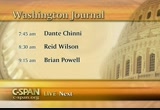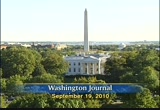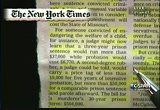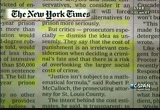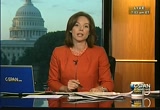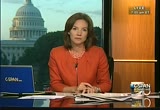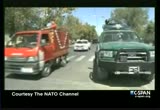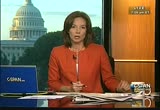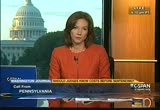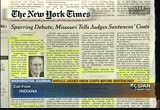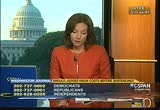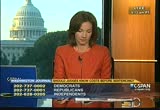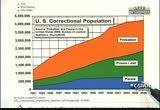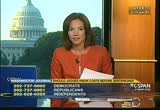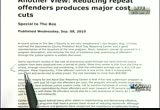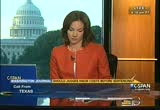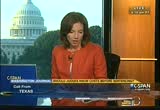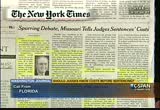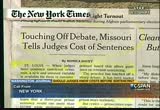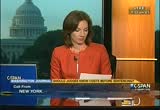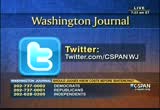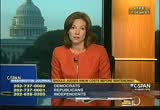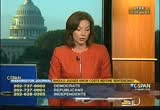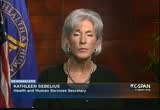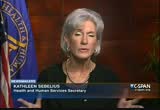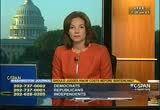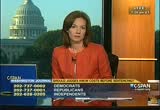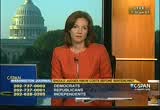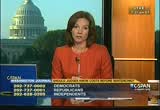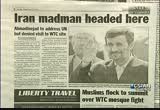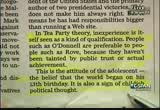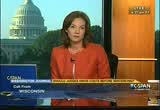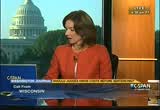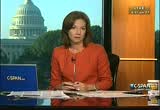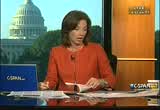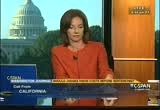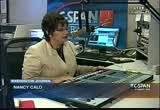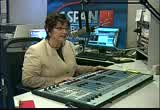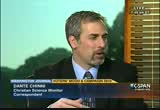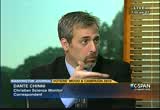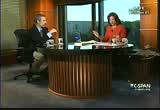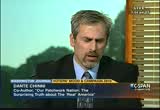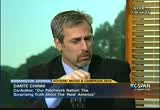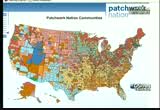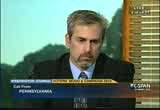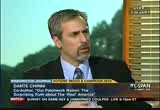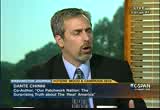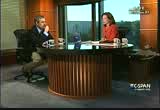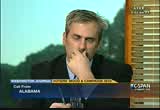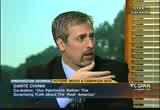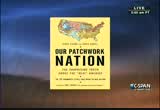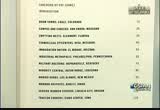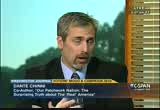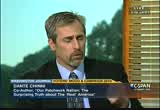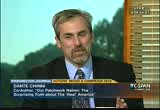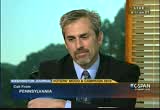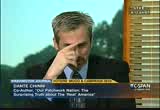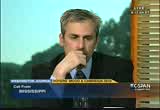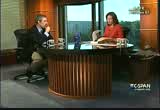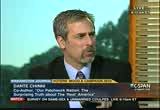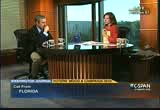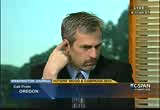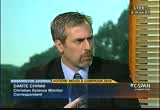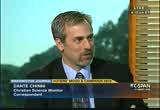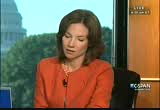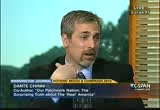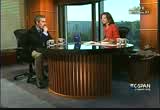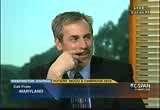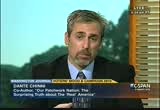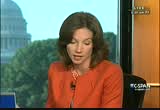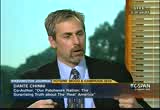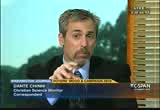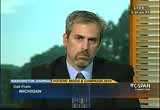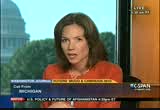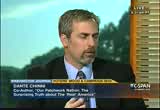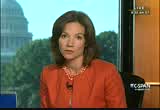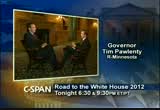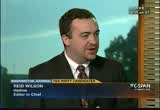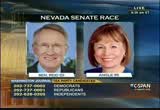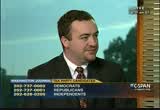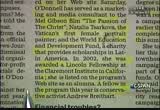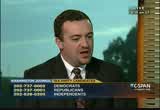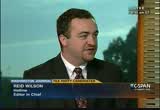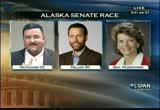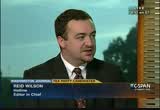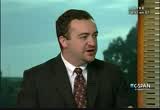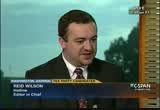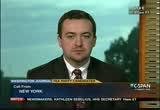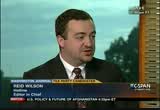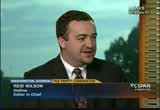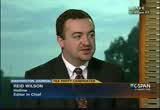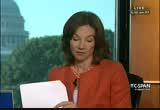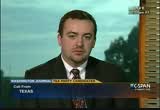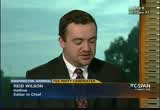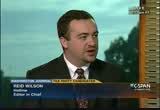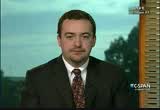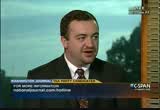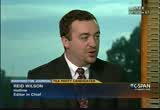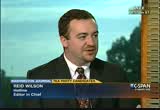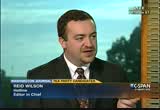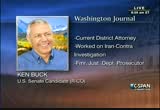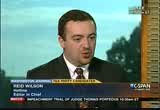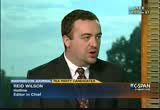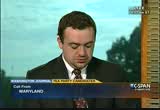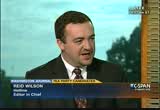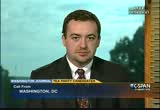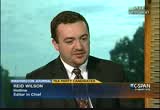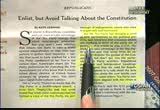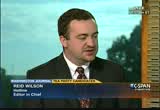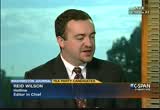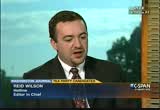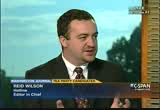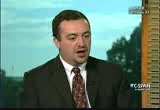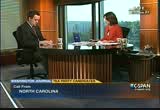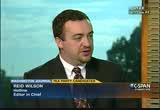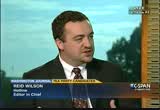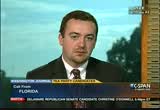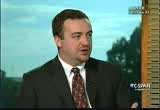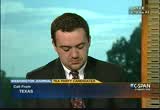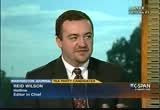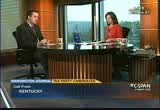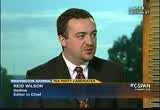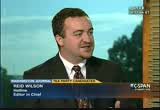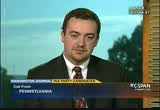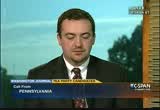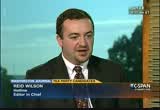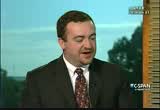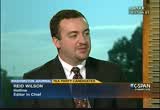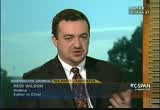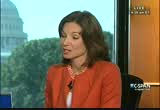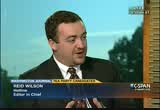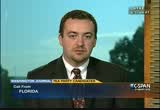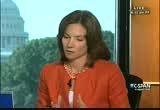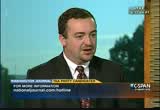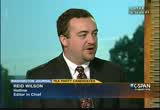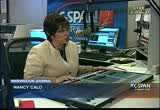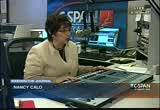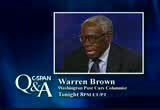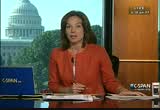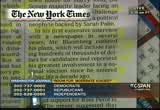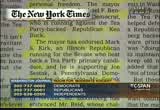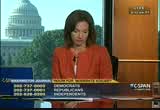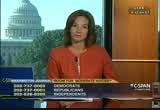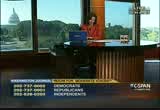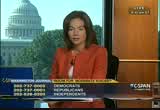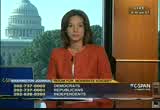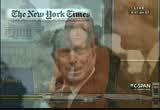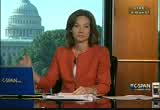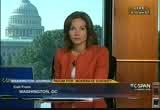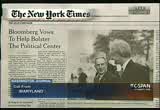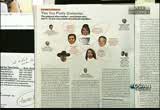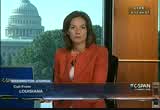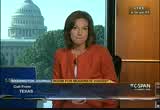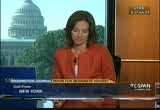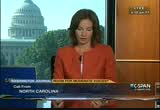tv Washington Journal CSPAN September 19, 2010 7:00am-10:00am EDT
7:00 am
[captioning performed by national captioning institute] [captions copyright national cable satellite corp. 2010] >> it's a busy political week ahead. president obama travels to philadelphia on monday to fund raise for democrats and campaign for senate candidate joe sestak. vice president biden will also be on the trail this week. in the "new york times" reports this morning that new york city mayor michael bloomberg is getting involved in campaign 2010. he will be fund raising for democratic and republican candidates that represent the political center. sending off challenges from the right, the tea party and the
7:01 am
left as well. the house and the senate return this week. the senate will take up the defense authorization bill and language in that legislation on the military's don't ask, don't tell policy. go to c-span.org to find out about our coverage on those events. front page of the "new york times" this morning, touching off debate, missouri tells judges the cost of sentences. we want to know from you this morning do you think judges should know the cost of a sentence before they give it out? phone numbers are on your screen. when judges here sentence convicted krms, a new and unusual --
7:03 am
we want to hear from all i don't have -- all of you this morning. we'll get to your phone calls but a little bit more from the article. the quote here says that there is no average case. every case is an individual case and every victim has the right to have each viewed individually and every defendant has that right. that's our topic this morning for the first 45 minutes of
7:04 am
today's washington journal. democratic line in new york. what do you make of this debate? caller: good morning. i read this article last night in the times. and i think it's the one bright light that might be coming in this economy downturn. our prison sentences have been way out of line. i think we should empty the prisons of all nonviolent krms, put them under house arrest, make them pay fines, have them work if they can find a job, and save that space for hardnd criminals that put us at risk. we cannot afford to how's these people. i mean, actually some of them live better than our poor. so i hope this is a turn and i hope other states will take this on. and i really love c-span. it's so important these days. thank you so much. host: thanks for the phone call. we'll keep talking about this.
7:05 am
but first, we want to get a quick update about the afghanistan elections. joining us on the phone is paul tate, with reuters and the afghanistan bureau chief. mr. tate, if you could tell us about the headlines that we're seing in this morning. here's one of them. afghan vote marred by irregularities. guest: good morning. it's certainly true there have been thousands of irregularities, we're told, even before voting began. thousands of voter registration cards, ink that was meant to identify people as having voted could be washed off. we even found some kids with bottles of bleach standing outside polling stations showing voters how to wash the ink off.
7:06 am
the counting will take a very, very long time. so we're not sure exactly what extent it will amount to or what effect overall it will have. host: and we also saw the headlines that there was violence, and that voter turnout was low. guest: that's true. the day kicked off with an earth quake about midnight. but at 4:00 a.m. there was a rocket attack near the u.s. embassy in kabul. there was spordic attacks across the country. some more than 300 according to the interior ministry here. so that did put a bit of a damper on the vote turnout. some dispute on what that voter turnout was. the number we have at the moment is about 4 million. the independent election commission has put the number
7:07 am
of eligible voters at about 11.4 million. so no matter what way you look at it, it does look at a pretty disappointing figures. >> what were afghanies voting on? guest: voting 249 states in the lower house of parliament. it's been described as a 249 mini presidential elections. in larger terms for the rest of the world, there weren't that many issues that would travel outside of afghanistan, very locally based election unlike last year's presidential poll. the important things that gives credibility is the level of fraud, the level of intim dation and violence. of course there's a war strategy review during december and just how this election was conducted. if they determine it was a
7:08 am
legitimate one will weigh heavily in those conversations in december. host: and paul, what time is it now there in afghanistan? guest: it's about 3:00 to 4:00 in the afternoon. host: it's semple hours later the day after the election. and what is the mood of the electorate there? what is happening now? guest: it's very quiet. counting has begun. there's a real mood of apprehension, i think. just a little while ago we heard three officials who were kidnapped yesterday had been found. if we follow last year's path to the presidential watch, we can expect that the taliban will try to attack convoy election convoys, carrying voting materials back to central voting stations.
7:09 am
so i think everyone is keeping very, very quiet and saying -- just trying to stay out of the way. host: and what will you be watching for in the coming days? guest: the number of complaints will be very important. it has been called by some a dispew tashese process and it certainly looks that way up until now. thousands of complaints are expected. there were something like 2.5,000 candidates. so there will be 2,000 losing candidates. and i would imagine that many of those will lodge complaints. they have to be lodged within 72 hours of the election. and then they have to be determined through a process that could take many, many weeks. host: thank you for your time. guest: you're more than welcome.
7:10 am
host: we're going to move on to our topic this morning in the washington journal. your view of whether judges should know the cost of sentencing. dave on the republican line. this is the front page of the "new york times" this morning. this headline about this is the kay in missouri and it's touching off a debate about whether or not this is a prudent decision. what do you think? guest: the caller: the important thing is the impact on the victims. the judges don't seem to realize that's what it's really all about. if -- they should be able to make room for people in jail who have mugged people, who have done armed robbery and stuff like that. because drug crimnals, they need to spend a lot of time in jail. there's other programs that are or should be available for people like that. but dangerous ones don't seem to get as long of a innocence
7:11 am
these days. host: a little more from the article. judge michael wolf of the state supreme court said judges have been asking for such data. nls, jeff, the democratic line. what do you think about this? guest: thank you for taking my call. and thank you for c-span. i think the whole issue today is that there's a tremendous cost of corrections that's put on the states and people are
7:12 am
trying to look for alternatives to try to lower some of the costs of incarceration. and i think that that should be an option when it comes to nonviolent offenders. when it comes to somebody who commits a violent offense, most of society would agree that the only option for them is an excute a prison sentence. but for nonviolent offenders that might be an option. host: ok. your thoughts. caller: my thoughts is they ought to take the people that, like child support and stuff like that, nonor bad offenders out of the jail. indiana is the so full of people, you would have no idea how many people is in there. host: it says in this article this morning that fewer than half the states have sentencing commissions like missouri's. in many cases they grew out of concern starting in the late 1970s about racial and geographic sentencing.
7:13 am
consider the theme of meeting of the national association of sentencing commission in august. sound sentencing policy balancing justice and dollars. lots of states measure the cost of imprisonment in new criminal laws. many states, for instance, calculate the average cost of housing a prisoner but that is rarely mentioned with down to the dollar figures for a specific person as the judge picks a sentence. oklahoma, john on the republican line. good morning. caller: yes. the one thing that i noticed about these things when they pick these sentences, is the fact that a lot of times when they incarcerate some of these people what they end up doing is giving them jobs to help pay for their incarceration. well, as a result of that, in a
7:14 am
lot of your smaller communities like in tillman county where i'm from, they end up in order for these people to help pay for their incarceration, what they do is give them the jobs that would normally go to people who are nonoffenders. so what you end up doing is even though the prisons try and help pay for their own incarceration or the cost of these different places, what ends up happening is they end up taking the jobs away from those who are not incarcerated. host: a look at the u.s. correctional population here. this is on wikipedia this morning. it shows here that the -- the probation and parole in the united states 2006 statistics. and it goes from 0 to 4.5 million from 1981 to 2006. and you can see that the probation population makes up the most and highest number, and then prison and jail and
7:15 am
parole. tulsa, oklahoma. valerie, democratic line. caller: yes. i believe that they should know the cost because it's too many prisoners in jail now over petty crimes. and i believe that it's getting to be a conconspiracyy with the drug thing and i believe they should consider studying the drug costs for legalizing it because there's this one judge that turned his -- he's retired and he's trying to legalize drugs but most people don't want to lose their jobs. but everyone else is losing their jobs. give people more liberty and grace in what decisions they want to make. host: lincoln, nebraska. good morning. caller: good morning. i'm going to tell you what. i've been around here quite a few years, and the judges now,
7:16 am
i hate to say it this way, are like the fareses were when jeefssuss cleaned the church out because they were gambling in there and trading money. that's the way the judges are now. host: do you think the judges are corrupt? caller: they are corrupt. host: many of you may have been watching c-span last week when we cord the impeachment trial in the senate of a judge in louisiana. this cq this morning, their magazine, has a history of federal judges who have been be peached. and it goes through the list there. if you go to c-span.org, you can watch the trial in the senate and the hearing there for po rtius. we covered the whole thing. gains, florida. should judges know the cost before sentencing? caller: well, you know, i think we need to look at why society
7:17 am
punishes, the specific versus general deterrence, and, you know, some of these people we can just kill. and is that a pearl neck last? host: we'll go on to a chart i found of federal prisons since 1950. if you look at where federal prisons were located and the majority of them and basically how many we had. and then you go to the map of 1970 you can see the increase there of the different locations across the country. and then, finally, in 1990, you can see the different areas with federal prisons. and the population of federal prisonners. we're talking about whether or not judges should know the cost before sentencing. i want to read an article from the sacramento bee and it's an opinion piece.
7:18 am
7:19 am
and that should have been a conflict of interest. but they didn't do anything about it. now, as far as the prisons are concerned, it's a fact that a lot of these judges and prosecutors are big-time share holders in the private prison system. i think that that's a terrible conflict of interest and something should be done about that. and lastly, our country, according to time magazine, we have almost 8 million prisoners , people in prison, as opposed to china and russia who have more people and probably have under 1 million. this is according to time magazine. host: where did you find those? do you remember what the year was on that? caller: it's been pretty recent. but you can do a google search. it's not a secret. it's a fact. host: i'm just wondering because according to the
7:20 am
justice policy institute report, the punishing decade from the bureau of the justice of bureaus, the u.s. just tiss it shows incarcerated americans from 1920 to 2006 and it shows it topping out at almost 2.5 in 2006. caller: according to time magazine recently, we've got almost as close to 8 million people incarcerated in prison at the point that they were making this, this is supposed to be the free country as opposed to these communist countries like china and russia. what's wrong with that picture? host: jacksonville, florida. alan, republican line. caller: i agree they should know. obviously the system is flawed because there's not enough space for them to go into jail right now and we have to create kind of a way, the cost. there's so much going on right now as far as law breaking in
7:21 am
our country that it's kind of overwhelming for our law enforcement and correctional facilities. host: let me get your reaction to this though. caller: that's true. host: so you don't take issue with that? you still think judges should know the cost? caller: yes, doy. host: all right. thanks for the phone call. new york, go ahead. caller: good morning. actually, i'm just calling because my husband is in prison for forging an instrument, possession of a forged instrument. he is doing four and a half to nine years. i don't understand for that type of sentence, a nonviolent
7:22 am
crime, that he has here three children that's out here and they are the people -- other people are doing other types of crimes that are much more violent and has been denied -- we're wasting money. there are people out here like myself who are working every single day that has to take care of people like that in prison. so i don't understand why they have these sentences. and also, i do believe that this is the prison that's the industrial system so it's privatized and there's a lot of money invested into it. host: new york, howard, republican line. caller: thank you for taking my call. i believe that the judges need to know the cost, that the community also does. because if someone has a misdemeanor or felony in their background it's impossible for them to get a job. so we need to be criminalizing not just the marijuana crimes but also every small drug possession because we're
7:23 am
ruining the lives of these children before they become 18, 20 years old and they're coming back to the community and back to the churches. now they cannot get a job due to their record. so they have to turn to a life of crime. so as long as we analyze it beyond just this analysis, we'll see that these prison sentences are really destroying these communities and the only way to help is to stop these sentences and stop people from getting criminal records for simple drug possessions. jesus went to jail for a nonviolent crime and so did many men. we have to stop these children going to jail for nonviolent crimes. we really need -- this is the biggest problem in the black community today and this is the one we need to solve. host: if you want to join in on this conversation, you can go to our twitter page. you can also send us an e-mail.
7:24 am
here's a couple e-mails for you. we're talking about whether or not judges should know cost before sentencing. touching off debate in missouri judges tell the cost, judges are getting the cost of sentences before they make their decision. in other news this morning, also on the new york front page is an interview with new york
7:25 am
city michael bloomberg. he says tea party is a fad. he backs g.o.p. moderates and the democratic senate leaders. he will be traveling to california next month to campaign for meg whitman the republican running for governor on a platform of corporate style accountability. he visited rhode island on thursday to champion lincoln cheafie, republican turned independent. and then he will host a fund raiser for hairy reid senator majority leader facing the unexpected challenge from sharon angel. we're going to be talking about the tea party candidates taking a look at their biographies and what's next for each of these campaigns over the next six weeks before the november elections with reid wilson of hot line. that's coming up at 8:30 a.m. eastern time. but before that, though, we want to show you "newsmakers"
7:26 am
coming up after this show at 10:00. "newsmakers" is with the hhs secretary about that new health care law which goes into effect this coming week. here's a little bit of what she had to say. >> if republicans were to take back the house in the mid-term elections and they did try to defund some of these mechanisms, to what extent would this actually chip away at pieces of the law do you think? >> i don't think there's any question that they could do some serious harm to what is now begun, which is a major change in the rules of the road. so the power is beginning to shift from insurance companies to consumers and back to doctors. and and their patients. we have announcing this week these major consumer protections which will finally be in place and have been talked about for decades.
7:27 am
companies won't be able to rescind policies any more, dump somebody out of the market because they got sick and they found a technical error. they will no longer be able to say to parents of a child with a preexisting condition, they're not going to cover your child at all or we're not going to cover the treatments that your child needs to get better. they won't be able to stop treatment because somebody hits a lifetime cap. and while that applies to a very small number of people, those are sometimes life and death situations. we'll have a focus on prevention and wellness which providers are thrilled about because what they know is too many people skip cancer screenings and mammograms. they don't get the full immunizations for their kids because there's still a financial barrier. so the outreach is important. and i think what the republicans will be faced with is really taking those benefits away. they will have to face their constituents who have their
7:28 am
children enrolled on a family plan and say that can't happen any longer. or, look at companies in their districts who have now participated in the early retirement program and say we're not going to pay those claims. that's not part of this puzzle. or seniors who will be getting a 50% decrease in their prescription drugs in the do nut hole starting next year and get preventive care as part of medicare with no co pays and have an annual wellness checkup. all of those benefits that are in place right now and will be there through the end of the year will cease to exist. host: our guest on "newsmakers" following this program this morning at 10:00 a.m. eastern time and 6:00 p.m. she's talking about the new health care law parts of which go into effect this week. north carolina, susan, independent line. should judges know the cost before sentencing? caller: yes. i think they should.
7:29 am
i think that they should know the cost, they should know the severt of the crimes, and they should be punished accordingly. there's too much of it's who you know and how much money you've got to slide into the courts and order where you get off or whether you don't. host: all right. fort mead, maryland. democratic line. caller: i think the judges should know the cost because if you are doing a white collar crime, you actually get more time than if you murdered someone. now, you know, you go through the provert stricken areas or the areas that are economically strained at this time and you're giving young people time that's ridiculous. you get them out, of course they're clearly not going to go towards their education. they clearly don't have another
7:30 am
route to go so they're going to go back to doing the same thing that, a, got them in the situation initially. and the economic status, if you look at the economic status of what we're going through now, even the jobs that they would have qualified for they can't get because grown people like us who now have to take care of these young people between the ages of 21 and 25 who can't get a job based on records or whatever, you've got to work second jobs at burger king or whatever just to make the morning. so it's a lot the judges need to take into conversation. host: we'll go on to virginia. republican line. good morning. caller: yes. we have where i live at we have three pen ten sharies here and there's over a thousand inmates there. and the state -- the tax people pay i hear anywhere from
7:31 am
$16,000 to $25,000 a year. and that's not right for us to pay that kind of money for -- to how's those inmates. host: how many jobs do you think those three produce for that area? caller: very few. host: whether or not do you say that? caller: because it's a low income county and stuff. the only thing that keeps our county going is the coal mines and stuff. host: ok. did you have more to add? caller: i would just like, like i said, $25,000 that taxpayers pay to keep the inmate in jail. and just like i said, they need to get those inmates out and bring our soldiers back home from afghanistan and train those prisoners over there for two or three weeks and send them over there. host: according to the national public radio, in 2006 the it
7:32 am
cost about $68 billion for corrections. the average cost per state inmate was $22,000 or about $62 per day among facilities operated by the federal bureau of prisons it was about $62.01 per day. housing the approximately 500,000 people in jail awaiting trial who cannot afford bail cost $9 billion a year. 20 years ago, most were released on their own recogzans trusted to show up at trial. most pay a bail bondsman to afford it. 62% are awaiting trial. manhattan, michael on the independent line. caller: good morning. i'm very disappointed in president obama. the situation in afghanistan as
7:33 am
prime minister blare said, it's 90% -- 90% of the her win produced worldwide. now, the situation is, it's stated over the last 10 years that 80% of the people that are in prisons are addicted to heroin. so this is a killer in the black community. i can't understand why police are breaking down doors to get an ounce of heroin and troops are walking by in afghanistan with 90% of the heroin. host: what does this have to do with judges knowing the cost before sentencing? caller: well, the situation is, bring down the cost. burn the drug fields in afghanistan. host: all right. illinois, democratic line. caller: good morning. thanks for taking my call. i think the judges should know the cost and i think that a lot of judges do know the cost. in this country, you can have a
7:34 am
nonviolent drug offender who gets sent to jail nor natural life. you can rape and murder a chile and get probation. it's something definitely wrong with that picture. and i've been told by some lawyers that the sevenst circuit court of appeals in the district where i live is the worst court of appeals that exists. i know we have a federal judge here by the name of zagel who just sat on the blegvitch trial and i think that he's just full of himself. i mean, it's just ridiculous the way they do things. and then there's the disparity in the law. as far as powder cocaine and crack cocaine. the sentence should be the same. that being said, you have as the caller stated earlier, it depends on who you are and what you have.
7:35 am
i love michael douglas to death as an actor, but his son should have received the maximum sentence for the crime, the drug crime he permitted just as anybody who has no connections and has no money. as long as we, in my opinion, have a situation where you've got these underprivileged young people who look at what happens in this country, the ones who don't want to vote, it's because they look and say it's still two different systems. it's one for the people that have and there's one for the have nots. and as long as they can see no fairness in the way law's are written and distributed, then we're going to have this problem. host: we've got your point. we're talking about whether or not judges should know the cost before sentencing. in other news this morning, ama din jad is headed to new york.
7:36 am
he will address on thursday. the headline is iran madman headed here. the "washington post" this morning op ed pages has a piece by chris smith about the u.n. meeting. u.n. goals must omit abortions. president obama is going to new york for that and he says that the u.n. document must omit abortion. and chris smith for those who don't know is a republican from new jersey and the ranking republican on the house foreign affairs subcommittee on africa and global health. also this morning is a piece by michael gearsen about the tea party. and he calls it childish thoughts in the tea party. he says that in the tea party theory, inexperience is itself seen as a kind of qualification.
7:37 am
we're going to talk more about these tea party candidates coming up here at 8:30 a.m. eastern time. but first this morning we're going to focus at about 7:45 on the mood of the electorate and how the economy is impacting that. and then later on, the last 45 minutes of our show, around 9:15 eastern time we're going to be talking about unconventional definition of family. wisconsin, matt on the republican line. good morning. caller: yes. good morning. i'm just calling, it seems like a lot of people are ignorant to the fact, i did eight years in federal prison and i just finished five years supervised release in august of this year. so it's the idea that there is no difference between violent crime and nonviolent crime. all crime is violent. and judges do not need to know.
7:38 am
what it costs to incarcerate someone. their job is to give sentences out to criminals. that's their job. flat out, that's their job. it's the idea that people know that it's illegal and -- well, you all, i guess judges hands are tied anyway. nebraska in america can go to the -- anybody in america can go to the library and find a sentencing guideline book. if it's a federal crime, they have a sentencing guideline. they can go below it if you cooperate or they can enhance you if you deserve to be enhanced. but it's a set guideline that they have to go by. it's not like they can say i'm going to give this guy a year and this guy 20 years. they go with their back groupped. everybody knows what it costs to incarcerate people. it's just the idea that a judge has enough on his plate. why does he need another number? host: all right.
7:39 am
new york. independent line. caller: good morning. i'm a correctional officer here in new york state and people need to know that judges just sentence people to time. that's their job. the cost to the prison snms is what new york state decides it costs. and people know new york state, they call it a dysfunctional system, but we have a lot of waste in our system. i mean, it just costs a ton of money just to run the system itself. there are people in albany that have positions that we believe don't even have to be there. and it just inflates the entire cost of the process having an inmate in prison. host: so it's not really the cost of having the inmate there. it's all the other bureaucratic cost that is go along with it? guest: caller: yes. they have people making decisions that doint understand how to make prisons run.
7:40 am
host: what was that? caller: the farms run by the prison systems. there are no more in new york state because they decided that's a simple way to save money. that's the bureaucrats decisions to close the prison farms and they were worthwhile programs. host: how so? caller: many of the people that go to these areas are from urban areas. and for them to be put in a situation where they have to get up early in the morning and have to do a decent day's work. many will tell you that's one of the few things they've gotten out of the system. because most of these people don't work regular jobs. and but there's a lot of things in new york state that are just way out of whack. there's just so much waste in the system. there's paper work that's redundant. every time somebody says something that's a complaint, we'll just put out a new form. we're just drowning in paperwork.
7:41 am
just the entire bureaucracy. that's just the tip of the iceberg. that probably goes for a lot of other bureaucracies in the state. and probably around the country. host: can i ask you, if there was one thing that you could tell bureaucrats in albany about the prism system that you think they misunderstand, what is it? caller: many of these people are not really -- how do i put it. they're not really security people. many of them have no concept about how a prison runs. like they the decisions, they just run numbers. many of these people are like just people, social workers, teachers, they deal with money. which is important. you know? but thofe actually understand that there are ways to consolidate programs within the prison system or consolidate activities. they don't need, for example, i'm in trancetation.
7:42 am
we don't have to go to certain prisons every day of the week. we can go there once a week and pick up a whole bus load and then disburse them throughout the state. we do multiple trips because someone forgot to an adden mate to the list. it's just a lot of bureaucratic waste. and there's a lot of ignorance and maybe incompetence. host: let me go back to the original question. do you think judges should know the cost? caller: i don't know if they fully understand the cost of the prison system. i'd like.com -- like the past caller said who was in the prison system, the judges, they don't really know what it costs to incarcerate. if they had all the figures. some of them probably do. i can't believe that they're that naive. but they just sentence people to time. you know, like the real -- like i tell the inmates when they say the judge sentenced them and that's their punished them.
7:43 am
no the sentence is sentencing them to the department of correction. host: a couple more things before we end this discussion. peter orzag who many of you know was part of the obama administration wrote an article in the "new york times" about the bush tax cuts. he is back today with a column about the health care plan for colleges if you're interested in reading. and he says that he will be focusing on this issue of medicaid and the costs of health care in his upcoming columns as well. writing in the "new york times" this morning. also, about the food safety bill that many of you are watching in the senate. there's a story this morning in the "new york times," senate bill addressing food safety is stalled. recalls focused on two-year effort.
7:44 am
also, this is the "washington post" book world. ten years of the national book festival. and c-span will be there this upcoming weekend on the maul for the ten-year -- mall for the ten-year anniversary. the "new york times" best selling list, freedom tops the list for fiction. and david limbaugh tops the list for crimes against liberty. he was a guest on friday. go to c-span.org to see that interview. california, william, good morning. caller: good morning. i wanted to say that 96%, according to the department of justice, 96% of people that are going to court who cannot bail out of jail because of their financial background or not having the money, 96% of them
7:45 am
are incarcerated or are found guilty according to the department of justice. i just think that the judges being aware of that more often should take those statistics into conversation before they continue with that. and i believe that will help a lot. host: all right. pennsylvania, your thoughts this morning, carl. caller: good morning. i think really it's not a bad cost at all. -- about cost at all. people want to legalize drugs, have the government pay for them like they do everything else. then they have the race problem. if they locked up more blacks -- more whites and less blacks, maybe they wouldn't be yelling. and they also want to have everybody go see a doctor and be in a clinic, pair down the jails is what they're aimed at.
7:46 am
it's not about cost. my god, when they legalize the drugs, the government and the taxpayer are going to pay all the cost for all these people to get drugged up all day long. host: all right. washington journal continues after this short break. when we come back we'll be talking to dante cheney with the christian scientists monitor about the electorate's mood and how the economy is impacting that. but first, a look ahead at the sunday shows. today issues include the fall mid-term elections, tea party candidates, middle east peace and afghanistan. we begin at noon with meet the press. at 1:00 p.m. here abc's this week. interviews iran's president. and then a discussion with secretary of state hillary
7:47 am
clinton. on fox news sunday beginning at 2:00, host chris wallace talks with karl rove, adviser to former president george w. bush. at 3:00 it's face the nation. host interviews former president bill clinton. note that republican senate candidate chris teen oh donl canceled her appearance. finally it's cnn's state of the union. candy crowly focuses on the mid-term elections. reairs of the five network tv talk shows begin at noon eastern with nbc's meet the press, 1:00 abc's this week, 2:00 p.m. fox news sunday, 3:00, face the nation, and finally at 3:30 p.m. cnn's state of the union. listen to them all on c-span radio on 90.1 fm in the washington area. on your i phone, on seers
7:48 am
radio, or on line at c-span radio.org. >> for me or anyone else who is considering continuing on in public service, i think the real question is do you have a positive vision for the direction the country should head? do you have specific ideas that could implement that vision? and do you have experience that shows you can handle it and get it done? >> on the potential presidential run, growing up in minnesota and his eight-year-olds as governor. >> warren brown writes the weekly column for the "washington post." >> it is argueable, i think justifiable to have an argument to say that we would not have a black middle class had we not had general motors, ford, and chrysler. >> in 2008 he surmtted the government bailout of the auto industry. tonight he'll talk about what's ahead.
7:49 am
>> this weekend on afterwards, the conflict between the first amendment and national security. necessary secrets. interviewed by former u.s. attorney general michael muecazeie. this weekend on book tv. >> washington journal continues. host: here's the book of our next guest, our patchwork nation, the surprising truth about the real america, the 12 community types that make up our nation. also the front page of the christian science monitor, america sings the blues. its author here. what is the electorate mood and why is it more than the sluggish economy? guest: there's a feeling i think amongst a lot of americans that they've kind of lost control of their lives. it's the sense that being part of an american is you control
7:50 am
your own destiny, or at least the belief. and what's happened with the recession really over the past i guess two, three years now is a feeling that not only that something is wrong in the country, but that we're not really hur how to fix it. and when people look at that, that gist them the blues and it also makes them surveily. host: to quote from the piece or one paragraph from the piece this morning. it says in a microcosm, that is what is behind much of the national mood. it's not just uncertainty of what's next. it's the difficulty of even understanding what went wrong and how to correct it. americans who take such pride in controlling their fate and deciding their destinies are feeling that they are being buffetted by forces beyond their control and comp hencetion. host: i had a great guest: i had a great conversation, i've been to these 12 communities so i know a lot of people, in eagle,
7:51 am
colorado where i went to do this piece. the person i talked to that gave me the idea for that quote is i talked to the person in charge of just economic development for the area around eagle county, and the city of eagle and eagle county. and i said, so when is this all going to come back? they said, well, i think it will be back in a couple of years. then, i really don't know. there's so much going on in the world i can't say what's going on. just talking to him, it's true. there's just a feeling that we think it's coming back. in eagle in particular, so much of what they did was built on construction. they have the tourism, the ski industry, the hiking, kind of the summer fishing, hiking industry. but really made the place go and grow for those last decade was construction. and that really does seem like it's gone and it's not really clear when it's going to come back. host: one part about that piece about construction and i thought that the viewers would
7:52 am
find this part interesting. in gypsum, about 20 minutes from the city of eagle, that there's a new public golf course and that it only became a public golf course when the old fa silt, the semi-private ranch went into foreclosure. it was not the most expensive place to play in the area. but with initiation fees of $15,000 it wasn't cheap. now you can play 18 holes of golf with a cart for $49. guest: not a bad deal. host: what happened? guest: what they say, the city bought the course. it was just sitting there on the market. it went into foreclosure and they said we'll buy it and it's great. the people will be able to play golf. and it's beautiful. designed by a professionally designed course. a beautiful setting. what it says in eagle and in
7:53 am
gypsum is that there's a way of life, veel is extremely wealthy. but this extended kind of marched further west into the valley. and that was based on, predicated on the growth of the area. basically all those people in gip sum worked construgs. and those construction jobs paid very, very well, and all of a sudden people who weren't thinking they would be able to buy a $400,000 house were able to do that. they were flush. suddenly that stuff dried up. they don't have the money any more. the net value, the net worth of a lot of people in eagle, not that they're all necessarily poor or they're starving. but what they have to their name is a lot smaller now. and gypsum is pretty far out. that area is not going to come back for long. they know that and they're
7:54 am
trying to embrace it and make it a positive. host: do they also see it that the excesses of 2000 are not going to come back, either? you're not going to have these semi-private golf courses in an area where most people who live there are construction workers. guest: and a lot don't work in construction any more. construction jobs, you know, there are a lot more construction jobs and building going on. when the construction goes away, the jobs go away. everybody will tell you that the go attitude of the early part of the last decade is gone and it's not really clear when it's coming back. host: so eagle, colorado is one of the 12 that you visited peeferedically to put together your book the patchwork nation. so what kind of community? because you give names to all these communities. what kind of community is eagle? guest: it really is a boom town. it doubled in size in six to eight years.
7:55 am
and all these boom towns share some common traits but the biggest is massive growth. they did -- you've got to be careful. they had massive growth. some of it's gone and they had a big influx of hispanics and latinos. a lot were with the construction jobs. a lot of those people have left. incomes have dropped. those places took off in the last decades, things don't look good. other places that are well known are clark county, nevada, and riverside county in california. those are a couple that people have heard a lot about foreclosures on in the radio and tv and print media. and there are placeses like that. and the point of the book and the project patch work nation is there are places like that in america. we tend to think of the country as states but there's -- i grew up in michigan. you get up into michigan
7:56 am
miltsha country. what we're trying to do with the book and the project is we took a lot of demographic data, as much as we could get our hands on, and we had it by county and we crunched it down to identify 12 different types of county in the united states. and we have all that data on top to look at what happened. and then we picked 12 places to go in on the ground level and just see what does it look like. host: another one is called the immigration nation. what is that? guest: those are communities with a lot of latinos and hispanics. and they tend to be based in the southwest. but the interesting thing is some of those counties pop up in other places around the country. and there's places that have had construction booms. in north carolina, the raleigh-durham area, there used to be one immigration nation community out there. we're going to recalibrate these things. when the new census numbers come in, a lot of these types
7:57 am
will get remade. it will be interesting to see who goes up and who goes down. host: tractor company? guest: what you think of as rural farming area. i go to iowa, a small town in northwestern iowa about 3,000 people. host: so in addition to the book, you also have a website and interactive map on the website where vures can go. what can viewers do with this? iveragesdz the nice thing about the map is there's a couple things you can do. you can scroll over and see where your county falls, the types. there's also a district map on there. so we've just literally within the last week have created a map of districts in america using the same kind of breakdown. host: congressional districts? guest: congressional districts. and you'll see there's the type map and another tab that says compare data. and the last tab is latest data. we've mapped a lot of different
7:58 am
things. where are the gun stores, the whole foods, the wall marts. they're interesting and fun but they're indicative of a place, which is what we're getting at. we're trying to get beyond socker moms and say let's talk about the communities and what the communities look like. host: let's go to the phone calls. frank on the independent line. and as we talk to you, we're going to try to play along with this interactive map and see what your area looks like, too. caller: thanks for taking my call. i want to say that i think all of this, the mall lays is fible finally coming back to hit us about this 30, 40 year loss of manufacturing in our country. and people say, oh, our output is the same and everything. but i can tell you that once you lose the manufacturing base, you don't recover it because you lose the inherent
7:59 am
knowledge. mfering industry, particularly high level, aut motive, arrow space, those industries are very complex. once you lose your base, talent, you never recover that because everybody is dancing -- advancing in the technologies and it doesn't come back. i worked for a company that manufactures capital equipment. and we send equipment to china and they hit us with a 17 to 20% tearive. that same product coming back to us is hit with a 3% tearive. and it just -- that's a difficult hurdle to overcome. and i just don't understand this, the people, particular economists when i hear them say what a great advantage this has been. if you were to take a poll in this country, 80 to 90% would be against -- maybe i'm exaggerating but it seems 80 to 90% would be against these
8:00 am
trade agreements which are patently unfair to the u.s. manufacturing industry. host: what county are you in? caller: west moreland. host: ok. guest: i grew up outside detroit. i'm very familiar with what the caller is talking about. this was a big dinner conversation in my house growing up. my concern about losing manufacturing base is not so much the loss of knowledge because i think we'll retain a lot of the engineering expertise and things like that. but what we're losing is the actual manufacturing jobs. those are very important jobs because what they give you is for people who don't have a college education, it's a good salary with good benefits and way to, if your kids want to go to college they can go to college. we think a lot of times in this country about the 50s and 60s how wonderful they were and the golden age, those who went to college could and everybody
8:01 am
lived a nice life and everybody had two cars. but that rested on the idea that we had a lot of these manufacturing jobs. and when you lose them you have problems. and i think when you take construction out of the next tune, because that's the other places you could go. they pay very well. so now you pul manufacturing out, manufacturing the percentage of the economy that's been cut in half. and it will come back but not what it was. and you pull these out and you will be down for a while now. what's the engine of the american economy? i'm not really sure about that yet and i think it's the caller is right to be concerned and it's something i think over the next ten years over this country we're going to have to figure out. . .
8:02 am
8:03 am
too bad around here. of course, you get a lot of mexicans around here. they raised chickens and also produce and sell of these chickens into these grocery store is and everything. that is about the main thing where they have taken up the jobs. but what i am mainly concerned about -- what we need to do, we need to go back to our own way of life. we need to start making our own products. if we cannot do that once again, and all we have to do is just start -- for starters, we need to stop buying our products from china. that is the number one thing right there. once we do that, we can collapse their economy overnight, whether
8:04 am
people believe this or not. their economy will collapse overnight wednesday -- we stop buying their products. in america, if people start buying american products. we have got to do that. host: in boomtowns like eagle, colorado, are they thinking about what is the next big export? guest: the question there is, what will we do? because, when you shift -- this is getting to the call about manufacturing -- when you shift from relying on manufacturing and construction, what are the jobs that are available? tourist and service jobs. you can make ok money in tourism, but it is not like what you can make been construction. the net worth of those homes will drop. i talked to a pizza guy quote
8:05 am
cranes.wned two he does not have health insurance. he is self-employed. you know, that is a pretty dramatic change in that person's life. multiplying that. construction is excavating, it's carpentry, its landscaping. all that money is gone. host: we talked about boom towns, immigration nations -- and other communities are empty nest and evangelical epicenters. guest: empty nests are people 55 and over. there is a county in florida called claremont. it has a couple of retirement
8:06 am
communities. host: this is in florida? guest: it is in florida. evangelical epicenters are places with a lot of conservative, evangelicals. and nixa, missouri, as one person described to me, they are probably in the bible belt, the buckle of the bible belt. they counted up the charts listing for sunday services. compared to the classifieds, it is more. church and faith is a big part of that community. the home of values voters. those places would be interesting to watch with the tea party movement. host: there is industrial metropolis, military bastions,
8:07 am
more men outpost, and service workers centers -- and morman outposts. is there one type of candidates that can run in this type of community? guest: no. when we talk about politics in the book, and we like to think every year that the country -- every four years, what will voters decide? when you look at the vote in these community types over the past three elections, 2000, 2004, 2008, the vast majority, the vote is not moving. it is incredibly stable. in others, it is more fluid, but they will not flip one way or the other. there are a couple that do fly lip. the money burbs did.
8:08 am
the immigration asian communities, because immigration because -- because immigration has become such an issue, it is evenly split. minority central -- that tends to be a lot of the old south with a large african-american population. but we also have some native american communities out west. the counties are similar and the way they break down, especially socially, and the way people interact. host: you said that evangelical epicenters are what to watch for tea party. what about the mormon outposts? guest: we are readily add them collapsed with the evangelical epicenters, but they are very different. mormon outposts evolved over
8:09 am
time when the mormons, based in salt lake city, went out. they are very conservative, but they are not christian conservative. they are not evangelicals. host: do they vote differently than evangelical secs? guest: if romney is a candidate in 2012, comparing what he does in the mormon outposts and evangelical epicenters, that would be interesting. host: if you read the book "under the banner of heaven," he makes the point that congress will not be able to legislate without thinking about the mormon vote.
8:10 am
guest: it is an interesting group. but it is gone the other way in terms of what we see it. the vote by county is getting more diluted. they are spreading out. in terms of the counties with a saltful moment vormon vote, lake city is not a mormon outpost. it is a boomtown. if mitt romney runs, and if you get in evangelical candidate, they could go at it. host: pat, you're ont h the air. caller: thank you. the problem that i see it largely in this country is the lack of facts on the evening news.
8:11 am
we have very little sex. no one tells the truth. everybodye facts. we rarely scratch the surface. that is dangerous for us. since we are talking about jobs and the 1970's, pittsburgh lost 250,000 jobs because of the upsweep of the steel mills. we have cleaner air and cleaner water locally, but we will have a mess we can never clean up. there is a myriad of problems, and i understand said governor rendell, who i used to be in isve with and now don't love, getting close to $1 million
8:12 am
going around the state commenting on how wonderful the shell drilling is. host: what did you hear there? guest: i think when you talk about the economy, when you talk about the evening news, number one, i think the evening news -- the audiences are declining. they need to do what they can it to get viewers. i think there are more places to go get information out. and you do not have to rely on the evening news. you can get on the computer, and there is a lot you can find out there. the big problem in terms of the media, and this is a point we make in the book, we tend to think of the internet as a network. it is wonderful because anyone could read the "the new york times" -- yes, it's true. when you go by the is community
8:13 am
types, communities have certain kinds of economies, a certain kind of culture. they are able to narrow cast these communities. in the east -- in this community, we tend to read these news sources. when you look at what is going on with the news media, because it is more spread out on the internet, there are different ways to get news. you can lock yourself into -- and that is something that you need to be concerned about. caller: good morning. i have heard a couple of callers who have called in and talking about china. basically, so far, the economic situation is, china is - -th- th that goes to china
8:14 am
goes to the hedge funds. these are western investors who have a big stake in china. it is not necessarily chai not taking jobs from the united states, it is -- not necessarily try not taking jobs from the united states-- china taking jobs from the united states. most politicians, it is greed. my congressman, when he first went to congress, she is now worth $3.8 million. host: are you voting against the incumbent in november? caller: it depends who is running against them. that is the situation. i tried to vote for the best possible, provided both of them are bad, i tried to get the very best. host: when you went across these
8:15 am
different communities and you looked at them, is that there the same strand that runs through them, that there is a distrust of washington. guest: right now, yeah. it feels like a very different country than it felt like into thousand eight. it really does. there is an enormous amount of distrust -- it feels like a very different country than it felt like into thousand eight. 2008. why can't this be fixed? there is a great quote from the former editor of the town of eagle, her husband said, we elect them. they go to washington, and they change. they are different people. we need to change the way that
8:16 am
works. maybe we shall let everybody served one term and send them home. he is very frustrated. host: do these people believe that about the insurgent candidates, these tea party candidates it? once they get there, it will change them, too? guest: i think they are leery of it. if they are behind a candidate, they believe in them and they will not change. you ask another candidate, i support them now, i do not know where they will be two years from now. a big part of their movement -- movement is a tough word for them -- the big part is the anger, the dissatisfaction, the distrust of even the people they are putting their and the concern that even when they come to washington, they will sell them out. host: jay on the republican lie in it in florida. caller: i am in marion county.
8:17 am
the tax structure would be the main thing we need to change to get our jobs back here. our tax structure is probably the highest you can get in corporate or ararea. fair tax seems like it would be a job magnet can get all those companies back. that is all i have to say on that subject. host: jeff, democratic line, portland, oregon. what is your comment or question? caller: basically, the reason why we are so prosperous in this country is because of innovation, whether it is the telephone, the car, the internet. the only thing that will drive our economy and make sure that we do not slip from the number
8:18 am
one economy in the world is if we invest into renewable energy, and that is the future. that is the only way we will get out of this economy we are in right now. host: are these communities talking about clean energy? guest: a lot of people see it as a way to turn things around. i would say to all issues like this, and to the caller, there is nothing wrong with innovation. i think the american economy is still very innovative. i love my iphone. it says engineered in america and assembled in china. it is cheaper to build in china, so that is where it is built. even when we innovate, even with the green energy, there were be a question of where the perpetual motion machine were rebuiill be built. i am not one that says we need
8:19 am
to build walls around the country and stock goods from coming in, but we do need to understand that when we send things to be built elsewhere, we have to understand the ramifications of that. we have not done that yet. caller: good morning. i think what might help the economy in america would be to have a tax deduction for anything that is made in america. if you want to buy a pair of socks made in america, you can write that up on your taxes. that is all i wanted to say. host: thanks, john. so, we have had a number of calls about exporting and manufacturing in china. does that describe the mood of the electorate? guest: it does and it hits on the broadest point, which is something is wrong and somebody is to blame. there have been plenty of stories about china and wal-
8:20 am
mart, high percentage of goods made there. they want both things. they want that to not be the case, but they still want to get low prices. i will say this. i go and talk to people in these different places, and i do think there is something of an understanding of what is happening -- it is not like i am a genius -- i look at the numbers in to look long enough you say, real wages have not risen since the mid-1970s. we do not have a lot of good high-paying manufacturing jobs anymore. you have to say to yourself, we can try things like tax cuts for american goods, but the world is a fundamentally different place now than it was 10 years ago. -- even 20 years ago. and it will be more different overtime. host: when you look at the mood
8:21 am
of the electorate across the country, obverses the culture of washington, d.c., because democrats have been in control. republicans were in control before that. both parties put forward solutions, and they passed laws, but when they do that, and the way they go about doing that, like the bailout for the banks, are they just completely missing each other and they do not speak the language of the electorate? guest: i think that is part of it. it is hard to explain. is like a lot of the argument the obama administration is trying to havel with the public. it would have been so much worse without the stimulus. without tarp we would have had a depression. they are talking past each other
8:22 am
in that way i think it is our fault in the media that we do not do a good job of explaining these things. you have to explain it over and over again to get through to people what you think is going on, because nobody knows for sure. but the other problem is, we are debating the health care reform bill. it has not even been enacted yet. people are talking about, i hate the health care reform bill and what is going to american healthcare. it is really not doing anything right now. you may be right, maybe it is horrible, but we can talk about that when it is actually enacted. now there is frustration. wanting to have something happen now. that is a real problem. host: republic the line. in maryland. good morning carrot caller. caller: there are 20 million people working for the federal and government. about 3 million people work for
8:23 am
the military. during this deep recession, the number of federal employees who earn more than $100,000 has gone from 13% to 19%. i would assume that you are arrayed washington, d.c., is a boom town -- you would rate washington, d.c. as a boom town, they say there are plenty of jobs. one out of every five federal employees is making more than $100,000. is it conceivable that one more million people working for the federal government could make the economy better? is there -- as any full grown,
8:24 am
thinking american believe that? guest: that is a great call. i would have to say that i do not know the numbers. the number seaside's are very interesting. i need to look them up and see if they are true -- the numbers he cites are very interesting. washington, d.c., there is not a lot of new housing construction. there is not a lot of rumor to put anything else. -- t herhere is not a lot of room to put anything else. when you have hard economic times, people ask for more from the government. it would not surprise me to seek government employment growth over the next decade because i think we have a lot of things,
8:25 am
problems we have to manage, and there will be a lot of anger about that. that is a lot of what the tea party is angry about. there is also having to deal with the way things are. i think the tea party of movement will have a very good november, but once they get their policies in place, i am not sure what that will mean. host: dante chinni is author of a new book, "our patchwork nation", looking at several different communities across our country and coming up with different types of communities in our country. you talk about the tea party anger. here is one more headline -- debt. $60 trillion in debt? trillion is what
8:26 am
the congressional budget office says. is that a sort of mixed message? does that feed into the anger and discontent? guest: people pick the number they want to make the printer they want to make. i think the national debt number -- this is why the economy will not jump start any time soon is the american consumer debt was about $13 trillion in early 2009. that is equivalent to u.s. and gdp. you have to pay that off -- the u.s. economy is 3/4 consumer spending. people do not spend when they are poor. they are less likely to spend.
8:27 am
they are worried about losing their jobs. people want to get the economy going. i do, too. i think it is a complex discussion. host: jackie in washington, d.c. caller: i would like to respond to the previous a gentlemen's call about washington being prosperous. there is a lot of joblessness in this area. i called to say is that we may have lost manufacturing but we have not lost the knowledge, the how-to principle of manufacturing. and i would suggest for those people who live in certain areas, who have certain expertise, if they could form a corporate and develop things that are good, even though it may be a little more expensive,
8:28 am
and let's cut our ties with all of these foreign purchases. that is what i wanted to say. guest: that is a tough thing to do. we are in so far right now. there is one interesting thing the caller said. we have smart people. they should come together and come up with ideas. build products in new ways of fixing the economy, getting us going again. i think that is what is happening. we talk in the book about what will happen economically. one community that will do well over the next decade is college towns. they are going to receive a lot of money for research and development, and they will do well. that is one thing we talk a lot about in the book. i think we will go to a hard decade, but we will not go through it equally. some places will do better than other. places with a lot of education will do well and they will get a lot of money from the federal
8:29 am
government for research and development. if you go to these towns, they are being encouraged to start thinking much more about what they want to do commercially. we are happy to have your brain here, but it is not bad for you to think like an entrepreneur. that is an interesting development. host: one state hit hard even before the recession is michigan. this next call is from lavonia. caller: i have several concerns about loss of manufacturing jobs in this country. manufacturing used to be a place where high school graduates could earn a decent living and buy a house and so forth. but if they are going to be offered nothing but low-paying, barely better than basic low wages, there is really going to be a lot of unrest in this
8:30 am
country. the second point i am concerned about is, in world war ii, we basically won that war by auto manufacturing the japanese and germans. -- by out manufacturing the japanese and germans. i served in world war ii. the germans did not have an air force. so we were able to invade. host: let me jump in. what did you do for a living? are you retired now? caller: i am 84. i was working until i was 82 because i enjoyed what i was doing. i had a consulting business. host: can i ask you about your city of lavonia. there are a couple of new manufacturing plants for
8:31 am
batteries to put in electric cars. what does that mean for your community? are you seeing a new people coming in? caller: there is in such as huge a loss with the automotive cutting very deeply, that there is still a great break hole in manufacturing jobs, which were decent-paying jobs. the state of michigan is really facing some very hard times, i think. host: dante chinni, what did you hear there? guest: i grew up there. i know exactly what he is talking about. the one thing i agree with is that when you have this many people who have gone from earning this much money, you will have unrest. i am not saying there will be writing in the streets, but you will have -- there will be
8:32 am
rioting in the streets, but you will have the rise of a populist movement in this country. i do not think the tea party movement is a serious populist movement. a populist movement is angry at the business establishment. they would not be in favor of tax cuts for people earning over $250,000. i think in the next decade, we will see a rise of the serious populist movement. i think he is right. when things are bad, people get angry, and they are looking for answers. i think there will be some anger in the u.s. host: coming up next, we will talk about the tea party candidates, those who won their party nomination.
8:33 am
we will look at their biographies. dante chinni is a correspondent with "christian science monitor" and co-author of "our patchwork nation". thank you. coming up next, we will turn our attention to tea party candidates with reid wilson of "hotline". [captioning performed by national captioning institute] [captions copyright national cable satellite corp. 2010] >> for me or anyone else considering continuing in public service, a real question is, do you have a positive vision for the direction the country should head, a specific ideas, and a
8:34 am
demonstrated way to show you can get it done? >> of outgoing governor tim pawlenty tonight on c-span. warren brown writes the weekly core column for "the washington post". >> we would not have a black middle class had we not had general motors, ford, and chrysler. >> in 2008, he supported a government bailout for the auto industry. tonight, he will speak about on "q&a". "after words". "necessary secrets." >> "washington journal"
8:35 am
continues. host: we welcome the editor in chief of "hotline". i want to start with christie and o'donnell. she is supposed to be on two sunday talk shows. she canceled those appearances. why? yout: one of the rules is never book in appearance and pull up at the last minute. she is last to win unexpectedly and capture the national attention. rand paul did this in kentucky. the national media descended upon them. rand paul then canceled an appearance on meet the press and stopped talking to the national media and it started only talking to his state media. sharon engle in nevada came under a firestorm and only
8:36 am
started talking to them that the media. -- the nevada media. christine o'donnell is latest candidate to shy away from the media. they do not want the national media to have the opportunity to confirm that. host: is that strategy working for them? guest: i think it has. if those races become about sharon engle or rand paul as opposed to the national mood? harry reid is doing everything he can to make that campaign about sharon engle. if she reframes the debate, she has a much better chance to win that seat.
8:37 am
host: ok, so christie and o'donnell. democrats want to make it about who she is. what are her qualifications? guest: she has run for office several times. she has never held elective office. her qualifications are questionable, and i think that was the point that mike castle was trying to make before she beat him on tuesday. the reason she was able to win is she captured the ethos of the tea party movement. she convinced republicans that castle was a republican in name only. she was able to convince voters that she was the more
8:38 am
conservative candidate. host: she has a psast in washington, d.c. she had a couple of jobs -- the founder and president of the saviors alliance for lifting the truth. she was on our program. we had to go back to our 1997 records of when she was on to find some bio information. after she won, her website was scrubbed. there is now more information on her website. according to the bio posted on her website on saturday, she has served as a market and media consultant to them mel gibson film "the passion of christ," the vatican's first female
8:39 am
the sea isainters, n alumnas she is listed as a of the claremont institute. what are her chances? guest: slim. she is the most conservative candidate. delaware is more a centrist-moderate state. no one thought of him as a liberal. -- joe biden as a liberal. they are centrists. they are close to the credit- card industry. they are jokingly referred to as the senator from mbna.
8:40 am
mike castle was in that mold. they have reputations for working across the aisle. but now the alternative is somebody who is clearly very conservative. that will give republicans a very difficult road, even though went mike castle was considered the front runner, he was considered a big favorite to win that seat in november. host: she was able to get 30,000 votes and the primer. our people are underestimating her? guest: that is a question we will find out. democrats are doing the best they can to portray all of these candidates who have tea party backing as out of touch. rand paul, ken buck in colorado. they are the more conservative candidates, they were in their primaries. the question now is whether or not in november of voters say, i
8:41 am
do not care. i will vote for them anyway. they are better than the democrats. we have not seen evidence that is not the case. host: let's go to alaska. the tea party candidate got sarah palin's backing. he was a private practice attorney, a former judge. at looks like on paper that he is a qualified candidate for this job. guest: absolutely. there is no question. i do not think there is any question of whether or not joe miller is qualified. he is the front runner at the moment. although, that race has gotten more interesting, considering that senator murkowski has decided to run a write-in campagin.
8:42 am
ign. republicans have a majority in alaska. as they split the vote, there is a chance for democrats to sneak through. joe miller is probably still the front runner in that race. candidatesthang that the have in common is the tea party express. sarah palin gets a lot of credit in the national media for her endorsement. it is one of the first things anybody mentions when they do a profile of one of these candidates. the real fact is, the tea party express, based in sacramento, has played a huge role. they have paid hundreds of thousands of dollars for advertisements on tv and radio that dropped in the last couple of days. they give these candidates momentum. they have a great winning record.
8:43 am
demavend profiles of sal russo who headsd th the tea party express. there are big profiles of him in "the wall street journal" on friday. we've highlighted him in "national journal magazine." they deserve a lot of credit. host: how does lisa murkowski run against a candidate that appears qualified? guest: it will be a tough road. there has only been one candidate, strom thurmond, w2hho won on a write-in campaing. gn. lisa murkowski said, back then, strom thurmond it did it without the benefit of facebook, twitter, social media that are
8:44 am
able to organize people. that is a really interesting idea, that a candidate might be able to build that kind of organization, to turn people out, educate them, and teach them how to spell murkowski right. i am not certain that lisa murkowski is the right candidate to test these kinds of outlets. you need to have a cult of personality. president obama showed during his campaign that he was able to engage the social media outlets because there was a cult of personality following of him. lisa murkowski is a centrist, somebody who talks about bringing a preparations back to alaska. i am not certain that is the right message. but it is a possibility in the future. host: she has $1 million in your war chest. how much does a joe miller have?
8:45 am
guest: he has raised more now. the tea party express has delivered money. christie o'donnell has raised nearly $2 million since her election on tuesday. when miller was elected, he had only raised about $250,000. host: we will talk more about sharon engle. and rand paul in kentucky. amsterdam, new york. joe, democratic line. caller: do you really think the american people are ready to slash unemployment benefits anddivided bysocial security and medicare under the guise of cutting the budget or rewarding rich people and
8:46 am
giving them tax breaks? one has to ask if these high income earners are people who create jobs, while aren't the taxs created at t6hhe low rates? about teare talkinga bou party candidate. guest: the democrats will try as hard as they can get to portray these candidates as being out of touch. talking about closing the department of education. rand paul wants to end farm subsidies. joe miller made controversial comments about social security. virtually all those candidates made some comments about social security that will show up in democratic campaign ads. the goal democrats have is to
8:47 am
try all of these candidates as out of touch and to scare voters into keeping the status quo because the other guys want to cut your benefits and kick your retired grandmother out into the street. republicans will fight back. that is really the democratic strategy, what the caller is talking about. host: give our viewers a preview of how it will be over the next six weeks. guest: we are starting to see the most negative campaign in history. i spoke with one democratic aide and he told me there or about 46 members of congress that had already started running television ads before labor day. the conventional wisdom is nobody pays attention to politics before labor day. the fact they are up with television advertisements tells you how scared they are about
8:48 am
it. how many are negative, i asked. all of them are, he said. the idea is to make the republicans unacceptable. the goal is to make them an untenable option. that has proven ineffective message. it is exactly what senator harry reid is trying to do to sharon engle. he is running neck-and-neck with her because he has portrayed her as a candidate he does not have the values that voters wants. host: let's go to a tweet here, talking about the alaska senate race. lisa murkowski is a perfect example of why moderates should
8:49 am
be voted out. guest: i am not sure that is accurate. lisa murkowski is one of the more moderate senators. she is a target of democrats looking for votes frequently. way. castle, the same the front-runner that sharon engle beat was the same way. i do not think it is all of them, but one thing we are clearly seeing is a reinvention of the republican party. it is still happening. as republicans talk about how they want to expand the tent, they are engaged in the process of picking out moderates. the 112th congress, it will be a different republican party. there will be fewer senators like lamar alexander, lisa
8:50 am
murkowski, willing to work across the aisle, and more senators like joe miller, and it might leadmike lee, people loven primaries by promising to stop the agenda. -- people who have won primaries by promising to stop the agenda. in utah, he came in third and the complaint agai nsnst him was he worked across the aisle. the health care bill was never written in final form. his big sin was working with democrats. the mood is about making this party the most conservative possible party. that may play well this year, but down the road, i am not so sure it will. host: senator de mint writes in
8:51 am
"the washington post" this morning, washington can hear you know. he says that the conservative fund that was designed to do just that. i knew in my heart the republican party can save this country if it could recruit more members to stand up for the principles of freedom. it took a rough primary cycle to find enough people willing to do it. it's time to give the democrats of heartbreaker election in november. austin, texas. laura, go ahead. caller: i see confusion in the media about what it is about the tea party that appeals to people. i used to be a democrat. i am now an independent. i do not believe that they represent americans anymore. i do not believe republicans represent this country anymore. both parties have broken the covenant between the political
8:52 am
people that we send it to represent us and the people who need representation. i just do not see anybody in washington tralee who understands the pain that is going on in this country -- truly who understands the pain that is going on this job. we are losing jobs. we have had political agendas shoved down our throats. when we voice our opinions, we are belittled in the media. the tea party is the first party to come along to say, we are listening to you. we will speak for you. i do not see that out of the democrats or the republicans. guest: she brings up a number of good points. the democrats and republicans who have come to washington, d.c., are more partisan. they have to be. their votes are not on a scale of one to 10. yes or no.
8:53 am
whatever it happens to be. washington is more polarized than the majority of americans. the majority are somewhere in the center and they do not think about politics all the time, and they don't argue about the things we argue about in washington, d.c. the tea party movement is something that we give a name to that is not a movement. it's a thousand movements. these are small organizations that a shutdown and may crop up again in another location. they focus on fiscal issues as opposed to social issues, which is what i think the majority of americans are focusing on now. one interesting statistic we sound in our al poll wa that 70% of americans have had a
8:54 am
close friend or relative lose a job during this recession. that is unbelievable. that is across socio-economic lines, across racial lines. this recession has affected a huge majority of americans. i think that is what the tea party movement is tapping into. democrats and republicans are trying to address those jobs. they talk about it nonstop. nobody has come up with an idea that has worked. americans are so pessimistic about the stimulus bill. that has hurt democrats as well. the tea party is a an amorphous blob,. whether or not it can be coalesced into something is yet to see. caller: i was interested in the
8:55 am
part where the tea party is short term or long-term. it seems that the tea party has always been here is that the majorityilent has finally stood up. guest: that is an open question. if i had to guess, i would say no, it would not be here long term. economic cycles change, and when the economy starts looking better, the tea party movement will fade. but the problems are big right now. this spending problems are getting to be on the top of voters' minds. the economy is on the top of voters' minds. in the short run, a couple of election cycles -- but in the
8:56 am
long run, whether it will be a third party, i do not see that happening. host: let's go to utah. mike lee, a former clerk to justice samuel alito. what are his chancesa? guest: he has good chances. he has the government and judicial experience. and he is running in utah, the most conservative state in the country. very deep red state. this is one of those races if you will pick the most conservative candidate, they will not lose to a democrat. people do not even bother to poll, because mike lee is expected to win. the democratic candidate is the liquor control board president.
8:57 am
a democrat will probably not win there for several generations. caller: now, where were the tea baggers when george bush was putting us through this? sarah palin. if president 0bama quit his job, the tea baggers would call her a loser. daughter hadent's gotten pregnant, they would say, if he cannot control his daughter, how can he control america. guest: the anger is nothing new. we have seen it over several election cycles. in 2006, they were angry enough
8:58 am
to kick out the republican majority. in 2008, they swept in president obama. 2010, they are still angry. the difference is that now it is the republicans' trun. urn. the consultant class, the cato institute, etc., would not express their anger because they had a republican in office with george borscht. they were angry with president bush, who they believe did damage to the image of the republican party, when you talk about hurricane katrina, ought to control spending. -- out of control spending. now that president bush is not in office, they are talking about changing their own party, too. i thought it was notable that
8:59 am
yesterday's at the values of voter summit that mike pence won the presidential straw poll. he is the number 3 guy in house leadership, but that does not mean he goes along. he is the only prominent republican and leadership who voted against the tarp bailouts of october, 2008, which tea party members and candidates relalally hate. hate. the fact that mike pence voted will play ait, that big role. host: let's go to colorado. the republican is ken buck.
9:00 am
he is the current district attorney. he is a former justice department prosecutor. what are his chances? guest: this is one o ftf the marquee races of the year. buck is the -- a very prominent. he has come to prominence of very quickly. he had a good education. he went to law school with elena kagan. he made a comment about how he she was editing the law review. but he was third in his class. he is a candid that engendered a lot of support. the most interesting thing about the race is the world that outside parties are playing.
9:01 am
for the first time, we will seek a outside organizations come in and out spend the democratic candidates by huge amounts. host: american crossroads. ed gillespie. guest: americans for prosperity. that is one that will spend a lot of money. the tea party express will spend a lot of money. hundreds of thousands of dollars are pouring into these races. in colorado, michael bennett has already seen hundreds of thousands of dollars spent in ad buys against him. republican organizations are looking to spend money against michael bennett. that will be a big advantage. that is the same thing that is happening around the country in house and senate and even governors' races across an the nation. colorado will be the test case.
9:02 am
9:03 am
yesterday. , steny hoyer, carden, mccullski, van hollen, all of these people need to be voted out of office. i am tired of them. and i can relate to the tea party because all of this spending that's going on and, washington, d.c., they're just not listening. they can't hear anyone. host: all right. guest: it's interesting. i think it's going to be very interesting to see what role health care, the health care vote plays in this year's mid-term election,. and i would be willing to bet it would be quite a small role. health care was a hugely controversial issue that got people out to the capitol rallying about it and gave democrats a really undercut their support in the polls. but at the end of the day the economy is still the most important thing. and the thing i've been saying since february of last year, this election will be
9:04 am
determined, will be decided based on how american voters feel about the stimulus package. and voters still feel it spent too much and didn't work and create enough jobs. no amount of studies that come out of the congressional budget office or the government accountability office or any place here in washington, d.c. is going to change their mind about that, while unemployment is still hovering at 9.6%. host: republican line, good morning. caller: thank you for taking my call. i want to say mr. wilson, i'm a huge fan of the hot line and read it religiously almost every day. afe two-part question. the first would be, with the tea party, what side do you see them playing within an internal party elections? when you look at the rnc and dnc, do you think they'll play a role in electing chairmen or members? and the special election today in new york, who do you favor?
9:05 am
thank you very much. guest: i hate to say, local new york elections, i'm not terribly versed on. but he brings up an interesting point. the tea party movement is going to play a role in republican politics in now going forward. the current chairman michael steele has engendered quite a lot of consternation among the 168 members of the republican party for some of his comments. but he has spent a lot of time reaching out to tea party members. he has had several long meetings with them. he is currently on a bus tour hitting 115 cities across the country in which he is spending time talking to these tea party movements. if the tea party is going to have a big impact, it's going to happen from the state parties and largely from -- in places like arizona, nevada, idaho, several other places like this. the tea party movement, tea party supporters have been able to infill trait, i don't say that in a if he nares way but
9:06 am
they're trying to get elected in presifpkt officers, fill these slots of the local guy who walks around the neighborhood and hands out fliers and gets people out to vote. there are a couple of state party chairmen around the country who believe their jobs are now in jeopardy because these tea party supporters are growing in influence within their own party and they will soon have the ability to kick out any state chairman they don't like. michael steele recognizes this. he is paying attention to them. whether or not these tea party groups have the influence by the time the chairman's election comes up in january i think will be interesting to see. host: this is the "new york times" this morning. it says that the tea party is a double-enled sword. they found that while most americans had not formed a view of the tea party, the percentage of independent voters who view it negatively had increased. but the tea party has brought a swell of new participants into
9:07 am
the political process and trends are working in favor of the party out of power. the trick is to take advantage of the tea party passion and stay away from its extreme. celebrate the genius but don't get into the particulars. it also talks about these candidates and how they have not answered certain questions on how they would vote on legislation pending before the congress. bush tax cuts. candidates like rand paul are not saying. host: candidates all across the country are being very ambiguous about what they -- how they would vote, how -- well, anything like that. joe miller in alaska won't say who he would vote for for majority leader in the senate. he won't say that he will vote for mitch mcconnell. he will say he will vote for a republican. sort of these candidates don't want to get into specifics because once they have specific
9:08 am
democrats can attack those specifics. in a coup of weeks the democrats will unveil what looks like the contract with america. we're not going to have the same signing ceremony that we had in 1994. it will be sort of a governing agenda that will come out of official house offices, legislation that they can introduce and very sort of generic. and general. there's going to be a lot of talk about a balanced budget amendment and reading a bill before it's actually voted on. there's not going to be -- there aren't going to be specific policy proposals or at least very many policy proposals because democrats will be able to attack that. democrats will be able to say look how out of touch republicans are. the one thing we have seen in terms of a really specific policy nish 2if6 from any member of congress is congressman paul ryan put out a roadmap for a better america, i think he calls it. he calls it the roadmap that presents some pretty harsh austerity measures to get the
9:09 am
budget under control. democrats have attacked that as wanting to cut social security and medicare regardless of the fact that it would reduce budgets and raise taxes and do various things, at the end of the day democrats are only talking about it in terms of the november elections. anything republicans come out with and really propose on a policy front democrats will be able to attack. host: let's take a look at dr. rand paul, his biography here, republican from kentucky medical doctor and founded the kentucky taxpayers unite. he is running in kentucky and these candidates running in delaware. are these candidates home groun? are they from these states? or have they moved to these states? guest: both of their cases, they are not from those states. rand paul is the son of ron paul. he was raised in the but he has been there a number of years. one thing that's going to play out, tip o'neal's old line is
9:10 am
all politics are local. rand paul has not been, as demonstrated at least, an unfamiliarity some aspects of kentucky politics. there's an annual political event there called fancy farm put on by a church, a big event where all the politicians come where they rib their opponents on stage and tell funny jokes, which is difficult if you're a politician you've got to find a good joke writer. but rand paul made a comment about how he didn't like fancy farm because people had been drinking so much beer and that was a tiny example, there is no beer in fancy farm. and an experienced kentucky politician would have noun that and wouldn't have -- they he then had to apologize to a church. in a larger sense, one issue that's going to play big on a local level in kentucky is the drug issue. there is a serious problem with drugs in rural parts of kentucky and youth who get who
9:11 am
take too many of the drugs. rand paul has said that's -- that should be under local control and that the federal government doesn't play a role in that. the opponent has taken a hard line against rand paul on this. his big accomplishments in office have all been about reducing the use of drugs in rural kentucky. he has been able to take rand paul's statements about the federal government shouldn't have control over drug issues in rural kentucky and use that very effectively to drive a wedge between rand paul and kentucky voters. we'll see if that's going to be a big factor come election day. i think rand paul's race is the sort of the bell weather in kentucky polls close first on election night. we'll get to see where the votes are coming from. if rand paul is able to win, then i think the tea party movement and the candidates who democrats will say are too
9:12 am
extreme are going to do a lot better than we think. rand paul is this, this race is becoming about rand paul. and if you're a democrat that's a great thing. you want to talk about the republican candidate rather than your own record. that gist jack conaway a chance but all the polls we see have rand paul leading. hartford, north carolina. beverly, democratic line. good morning. caller: good morning. where do i begin. ? first, i just want to say it's very disingenuous to even say that these tea party people are against republicans. remember the r after their names. and remember that they were formed only a month after the election of a black president. i think really that they are the, what, the vocal people. they're very vocal with their kkk ideas, radical ideas.
9:13 am
and so the big boys at the top are just sitting back and letting them run. host: have you heard about this new book by kate who writes for the "new york times"? she wrote a book looking at different tea party members supporters called boiling mad. we had her on this show and she talks about there are fringe elements to this tea party movement and some of themselves are racist. but in general, they're not racist. how do you respond? i think we lost her. guest: i think there's an important distinction we need to make here between the tea party and the republican party. they are largely those who are tea partiers are republicans and they're going to vote republican but there are two sort of sets of the republican party right now. there's the set that is sitting here where we are that's inside the 495 beltway and then there's the set that lives out in the rest of the country. the folks who live here are the ones who are pushing people
9:14 am
like charlie crist if for senate in florida, mike castle in delaware, sue for senate in nevada, jane norton in colorado et cetera all over the country. and then there are the voters out in other parts of the country who call themselves republicans, who are sort of trying to take back the party from the beltway set. and those people from outside washington, d.c. have been very successful this year. all four candidates i just mentioned lost their primaries. or, in charlie crist case, he abandoned because he was going to lose so badly. so i think there's a big movement across the country to take back the republican party from the folks in washington, d.c., the long-term impact is going to be fascinating to see because the folks in washington, d.c. are not necessarily more moderate or conservative. i think they're less ideological and more practical in terms of who can actually get elected. and instead, the folks on the outside are these people who are more conservative in zwrenl
9:15 am
and not necessarily the message disciplined and when you interview them or when i interview them they're going to say some impolitic things because they don't have talking points in front of them. host: jacksonville, florida. independent line. go ahead. caller: yes. i'm an independent person and voter. i've been that way for several years now. i don't think that branding of the independent nor how people are branding the tea party members are necessarily correct. and i just preface my statement on that. in addition to this, i think that the issue of racism as it per tains to the tea party is a valid discussion. and i also feel that many people are trying to skate over that. you have fringe people in the democratic party, republican party, independents. but the fact of the matter is i think it's deeper than that when you look at the fact that we have an african american president and the work that
9:16 am
this man has done in the last 24 months and then compare it to the work that was done by previous presidents in previous times under some similar situations. host: that was david independent line in jacksonville, florida. we're going to kathy on the republican line, also in jacksonville, florida. caller: first i'd like to comment to the caller that just hung up, i believe that this president has destroyed this country by the things that he has passed, and i think you're going to see that in the future. but as far as the comments that we're making right now, i believe the gentleman that's on there has made the comment that we, the tea party, is not going to be a movement that we're going to see down in the future as being very strong. i believe he's incorrect. i believe we're going to see that in the future that he also doesn't know what he is talking about. i believe our country is heading down the wrong path and i am all for the tea party movement. i'm not a part of it but i do plan to join it.
9:17 am
and i see them nothing but being a strength for this country and trying to get it strong where it needs to be again. that's all i have to say but thank you. guest: she makes a good point that the tea party movement is playing a big role here. we've seen it in these republican primaries from around the country. but when the economy changes, when the economy gets better, the tea party movement will become something else. every party evoves. every movement evolves. and when in economic tough times, these sort of outside groups tend to spring up. they are always subsumed by one of the two major parties. i think we're going to see that happen to the tea party movement. it's not -- it will have more of an influence on the republican party than maybe some previous movements have. but, at the end of the day, it's not going to crop up as its own third party. tea party folks themselves will tell you they would rather work within the two-party system
9:18 am
than they would bring up their own party because they believe, i think rightly believe, that if they do create a third party, that will give democrats more opportunity to win because you'll be splitting the conservative vote. host: the issue is all over the papers this weekend, today's included. and it's also the topic of the front page of time magazine, tea party time. how conservative rebels are rattling the establishment. caller: great work on the hot line. read it all the time. i think that the democrats are going to do very well in november as opposed to what everybody thinks. the tea party i think the candidates that are winning right now are going to split the vote when you have people like mur cows kentucky in alaska deciding to come as a write-in candidate. all those republicans who lost, if they continue to run, i think it will be in favor of the democrats. also, i think that it go to republicans can't vote.com, i
9:19 am
think you'll see where we're trying to distinguish that the republicans are taking the country backwards. and that's not where we want to go. guest: i think it's -- we've seen a very bizarre election cycle so far. we've seen not only -- we've seen more incumbent senators lose their primaries than in any year since 1980 when republicans had a great year in primary elections and now we're seeing one of them is running as a write-in candidate. another former favorite, charlie crist, left his party and is now running as and independent candidate and polling in second place, for that matter, where as the democratic candidate is in third by a long, long ways. this is -- this has been a very bizarre election cycle. there are going to be members of congress on november 3rd who will wake up and say, wow, how did this person lose? and then we'll take a look at the rest of the results and say, wow, how did that person who was supposed to lose,
9:20 am
actually win? i think we're going to see a very different kind of election this year. host: bill in kentucky. good morning. caller: good morning. i'd like to say that there's no question about it, mr. paul is going to win in kentucky. and i would like to address something that was said earlier that, remarks, as to how this president accomplished so much. this president accomplished so much because he had such vast majorities in both the house and the senate. had he not had those vast majorities we never would have got the health care bill through and i think everybody knows that. that's about to change in this next election. and i've got a lot of friends and associates who are democrats and i can tell you this they're not enchanted with this president or this administration or the direction that this country is taking over the last two years and i think there are going to be quite a few democrats, possibly the reagan democrats, the ones who are left over, who are going to vote against the democrats in this upcoming election. but they're also going to vote
9:21 am
against liberal and wishy washy republicans. and that's what this election is about and that's primarily what the tea party is about. host: comment? guest: one fascinating we've thing in terms of president obama's approval ratings is sort of inside the demographic numbers. president obama did very well with white voters, something that democratic candidates don't necessarily do. john mccain still won white voters but president obama did very well with them. support for his agenda and his approval rating among white voters specifically among those who have been to college, folks who should be democrats, is just tanking. these are voters who have not seen the results of president obama's agenda and he is cratering among them, even among hispanic voters who are becoming more and more of a democratic group, he is losing some popularity. so this sort of specific demographics, you mentioned some democrats in kentucky. those are the folks who are
9:22 am
starting to say, well, i'm not so thrilled about this guy. and those are the folks who president obama now have to focus on for the next two years. another point he made, was talking about the democratic agenda that has passed with such a big democratic majority. that is going to change. there are going to be much slimmer democratic majorities, maybe even republican majorities in one or both chambers, probably not the senate but in the house republicans have a great shot at taking back the house. president obama will be able to sort of triangulate as bill clinton's team used to call it back in the 1990s, when -- triangulate by focusing on what republicans are doing and drawing a contrast between himself and republicans. it will also give him the opportunity, give republicans, i should say, the opportunity to stop the obama agenda and instead start talking about sort of other issues where there may be room for compromise. they're going to have to deal with a budget, with appropriations bills, and when you need 60 votes in the senate
9:23 am
to move basically anything these days, it's going to be a more bipartisan place unless it becomes a completely partisan place, and then everything is going to shut down and we can see a repeat of the government's shutdowns under knut gingrich. host: we're talking with with reid wilson, editor in chief of the hot line here this morning. if you were expecting to see brian powell, unfortunately he won't be with us this morning. we'll try to get him back on the program at some point. but reid wilson will be with us then. we'll extend you until 9:30 this morning and then turn the segment over to another directed question. let's try to get a couple more phone calls in here for reid wilson first. philadelphia, pennsylvania. go ahead. caller. caller: yes. host: you're on the air. caller: i'm calling on a democratic line. my name is lor rain. i'm calling from philadelphia. host: go ahead. caller: am i on the air?
9:24 am
host: you are. caller: ok. the gentleman is right when he said the tea party's agenda is to stop the obama administration from ever achieving anything. i can show you an instance that proves that the tea party is made up of racists. and it's all about proving that a man of color, forget black, but a man of color across the board cannot run this country. they can not allow for a man of color to get in office, to do a good job as a president because they feel as though that somehow diminishes white superiority. but let me say one thing do not hang up. the tea party came into existence on february the 29th, 2009. that's one month and nine days after president obama was inaugurated. the tea party showed up on the mall screaming and hollering on april 15, 2009 about taxes when
9:25 am
they were paying the same taxes they were paying under the george bush administration. it was the -- host: we've got your point. guest: i've heard a number of callers today bringing up the word racist around the tea party movement. i'm not willing to call the tea party movement racist. sure, there are people in the tea party who are but there are people in every organization or movement who are. there are people in the democratic party, in the republican party. ok, there are fringe elements, we get that. but at the end of the day, i mentioned earlier, the monitor polled that all state and national journal do, 703r9s of americans who have a -- 70% of americans have a close friend or relative who have lost a job. the economy is in real trouble. unemployment at 9.6%. 21% told us that they were looking for a job. one in five americans looking for a job. that's unbelievable. and it cuts across all, the wealthy, the middle class and the poor. it cuts across white, black, asian, latino.
9:26 am
every possible demographic you can have is feeling the effects of this recession. i don't think there's any question why the tea party movement has sprung up. there is an anger and a fear in this country. ok, yeah, it happened under president obama who happens to be african american. i think it would have happened under a prt hillary clinton or a president joe biden or whoever it happened to be john mccain. there is this fear in this country that the economy is still bad, that people's own lives are being affected. that their children will not have the life that the positive parts of life that they have had, that they will be leaving something worse for the next generation. that they really deep-seated fear. and i think that's why the tea party movement exists. host: you said it cuts across for black voters as well. the president was speaking last night to go out and continue what they did for him in 2008, to do it again saying the work isn't done. can he motivate black voters to get out? guest: that's going to be a
9:27 am
critical element of the democratic's game plan. it's not just black voters, it's hispanic voters, young voters. the democratic national committee has pledged to spend $30 million turning those voters out again. we'll see whether or not they can actually do it. and if those voters go out, if they vote democratic as strongly as they did back in 2008. but that's a key element to the democrat strategy this year, is to turn voters in a typical poll when somebody is asked how likely are you to votte, there' a 1-10 scale, one being the least likely i'm not going to vote, 10 being the most likely i'm read dwroy march out the door and vote. what republicans at the moment are all 9st and 10s. they're very high intensity. they want to go out and vote, and vote the democrats out and vote their guys back in. democrats are lower on the scale, on the intensity scale. what president obama must do in the last six weeks, president obama and all democrats around the country, is turn those fouffs and fives and sixes into
9:28 am
athes, nines, and tens and get them to the polls. turn on the democratic machine that's coming in the last several weeks. host: denver, colorado, tony, independent libe. go ahead. guest: real quickly. with -- caller: when you look at these observations, probably 20 years out in the future, what i think is what's happened is we've seen republicans with their policies and the wealth that's concentrated at the very top and now at the very end of the bush administration and the beginning of the obama administration, trying to rebalance and save the economy. and what the tea party will probably be credited for 20 years from now is saying something was wrong and it had to be fixed. and i think that's how the two parties will be viewed along with the tea party 20 years out. i would be interested to hear his comment. guest: i think he brings up a good point. one thing for the first time in a long time when voters are
9:29 am
asking what issue affect youse the most, spending is creeping up. the second most important issue after the economy, the economy is still overwhelmingly the number one. but spending is getting up there. there is an ongoing debate in the this country largely within the republican party right now, democrats talk about it a little bit but not too much, about the federal deficit and how to reduce it. and sort of the long-term answers, long term really ah stert measures that we saw in great britain or in greece or some of these european countries that have had some tough economic times restraining the growth of government, restraining the growth of these deficits is something we'll be talking about for a very long time. paul ryan's roadmap projects reducing the deficit in 50-year chunks. so we're talking about over the course of a couple of generations in bringing down what is becoming a huge issue. host: tweet here from a viewer.
9:30 am
guest: in 2006, i think i'm getting these numbers right, i may reverse them. in the primaries democrats turned out more than republicans by about a 3 million vote margin. this year so far, republicans have shown up at the polls more than democrats by a 4 million vote margin. so it could be 4 in 2006, i can't remember which but it's a 7 million vote swing. that tells you a lot about the enthusiasm. one thing republicans should be concerned about, they should keep this in mind is what happened in pennsylvania's 12th congressional district after john murtha died. the special election to replace him all the republican polls showed that the republican candidate was winning. but what the republican polls didn't ask was about voter intensity and the democratic candidates themselves, the
9:31 am
democratic polls did ask about voter intensity. in the last few days before that election, the 7, 8, 9 -- the 5, 6, 7,'s became 8, 9, 10. democrats turned on their machine and now the democratic is a congressman and the republican candidate lost this race by 8 points when republicans expected to win. so democrats will become more engaged. they will turn out more. the question is whether or not that enthusiasm can really be there and whether or not it's enough. we'll see if it's enough. but the commenter has a good point. host: one last phone call here. orlando, florida. john, republican line. go ahead. caller: good morning. i'll make three points. first, i'd like to commend this gentleman for making the comment on the fact that there are racists elements in every phase, in every race, every whatever it may be, every group. so i think individuals cheapen their debate or any discussion when they try to make a tea
9:32 am
party out to be a racist. i'm not a member don't plan to be, but i like what they're doing. and they have the right. number two, when people keep trying to make everything just be about black, he's black because his daddy was black. but his history of growing up partially in indonesia and the majority of his life was spent growing up in hawaii. hardly any blacks there. he really did not become a part of the black community until he got to chicago. and that doesn't -- in which he began to be more cult turd in dealing with the black community. number three, i think until people begin to stop allowing pundits, the media, and everyone associated us with just party affiliation. if you're a democrat you've got to be good, if you're a republican you have got to be good. it should first be america, what's best for the country. host: we're going to leave it there on that point and ask reid wilson here before he goes, what when you look at these tea party candidates that we've talked about today, what
9:33 am
should viewers be watching for as indications of how these may end up? guest: in kentucky, i think we're really watching whether or not democrats can sort of have the impact that they say they can have on rand paul. even the republican establishment tried to bring down rand paul in the primary elections. none of their attacks worked. democrats say they can make this race all about rand paul. i haven't seen any evidence. and if it's not all about rand paul, i think he's going to win. and neither candidate is going to be popular by the end of the race, but harry reid needs to be less unpopular than she is if he wants to keep his seat. share ron angle, the race is already about her. that hasn't proven a game ender. in several other states, democrats are really trying to make all, er single bit about f of these contests about the candidate.
9:34 am
about ken buck in alaska. even in california across the country the focus is going to be on republicans and if republicans can fight back and talk about the national landscape, the national economy, and what democrats are doing wrong they've got a great chance to win the house, they have a chance to get close in the senate. host: front page of the "new york times." bloomberg vows to help bolster political center. says he is going to be campaigning, fund raising for democratic and republican candidates who are moderate. and we're going to ask our viewers to weigh in on that issue. is there room for moderate voices? what do you think? guest: there should be. the great senators of history were all moderates. the great members of congress in history were all moderates. even extreme partisans like orerin hatch and ted kennedy were able to work together a lot. one thing we have seen though over the last couple years is the influence of the extremes on both sides. you've got democratic
9:35 am
candidates kowtowing to -- well, most liberal part of their base, you've got republican candidates being obsequiesce to the most conservative parts of their base instead of really talking about the middle, talking about the mike castles of the world, the bloombergs of the world. host: can michael bloomberg make an impact? guest: this is the problem, people get excited by the extreme, by people who are passionate about the extremes. it's really hard to be passionate about being a moderate. host: all right. thanks for your time this morning. guest: thank you. host: coming up next, the front page article about new york city michael bloomberg saying he will campaign for those he views as moderate. first, a look ahead at the sunday shows.
9:36 am
at 1:00 p.m. hear abc's this week host interviews iran's president. and then a discussion with secretary of state hillary clinton. on fox news sunday, beginning at 2:00, chris wallace talks with karl rove, adviser to former president george w. bush. then at 3:00 face the nation. a note that republican senate candidate of delaware canceled her scheduled appearance. at 3:30 p.m., cnn's state of the union. again, reares of the five network tv talk programs begin
9:37 am
at noon eastern with meet the press. listen to them all on c-span radio, on 90.1 fm in the washington, d.c. area. on your i phone, or on line at c-span radio.org. >> i think the real question is do you have a vision, a positive vision for the direction the country should head. do you have specific ideas, and a demonstrated set of experience that shows you can handle it and get it done. >> on a potential presidential run, growing up in minnesota, and his eight years as governor tonight on c-span.
9:38 am
>> it is arguable, i think, justifiable, to have an argument to say that we would not have a black middle class had we not had general motors, ford, and chrysler. >> in 2008 he supported the government bailout of the auto industry, and tonight he will talk about his life and what's ahead for car makers on c-span's q and a. >> this weekend on afterwards, the conflict between the first amendment and national security. host: if you were expecting to see this morning brian paul, unfortunately we couldn't make that satellite uplink work this morning. but we'll have him back on the program soon. he was supposed to be joining us from indiana this morning.
9:39 am
instead, for the next 25 minutes we want to get your viewpoints on whether or not you think there's room for moderate voices here in washington. based on a front page story about new york city mayor michael bloomberg and his plan to bolster those moderate voices, whether they're a democrat or republican. it says in the article that next month mr. bloomberg will travel to california to campaign for meg whitman and the republican running for governor. and on thursday he was up in rhode island champ yng an event for lincoln chafee, a republican turned independent. and in perhaps the mayor's most direct confrontation with the tea party candidacy, he will host a party at his manhattan townhouse for harry reid.
9:40 am
9:41 am
so we want to hear from you this morning. do you think there's room for moderate voices? north carolina, lawrence on the republican line. go ahead. caller: my problem with the whole thing is i believe that even though i don't agree with the democrats and other people, i don't feel that they should be wiped off the planet. we have to somehow work together.
9:42 am
and so that's why -- i stopped agreeing with president bush and i don't agree with obama. i think that the banks are running obama just like they were running bush. so what really bothers me is there is going to be -- there is no moderate voices because the plan is to wipe out a huge part of the population due to just economic woes. and the woes are brought up simply because the banks themselves is a tool used by about 200 million rich folks -- not 200 million but about 2 million rich people to wipe out the other 298 million people in this country. host: detroit, michigan. democratic line. room for moderate voices? caller: yes. absolutely there's room for moderate voices. but there's also room for honesty and truth. and right now we have the media and a system that's been set up
9:43 am
to be propagandist and it's not telling the truth. and that's -- i couldn't hear you. host: we're listening. we heard your point. just a remind tore our viewers to turn down those televisions when you're about to be on air this morning so we don't get feedback. she said she received countless phone calls, e-mails and faxes urging her to stay in the contest. she says she is listening to my constituents and is going to give theam choice. she says the suggestions by the g.o.p. nominee joe mill tore do away with medicare social security and the education department are too radical for most scenes. she acknowledged that a -- alaskans. virginia beach. good morning. caller: thank you for taking my
9:44 am
call. i do believe there should be room for independents who are a third party. it seems to me that the tea party is not really serious because they sided with the republicans. the democrats don't -- the moderate democrats really have no where to go. so surely there must be room for a third party. host: all right. virginia, david, republican line. good morning. caller: i would just like to say i don't think that mayor bloomberg would be a proper voice for what i would consider the moderate with his stance on the mosque at ground zero i feel that he has clearly established himself as liberal, not a moderate. host: a little more from the "new york times" article about bloomberg vowing to help bolster the political center.
9:45 am
texas, democratic line, good morning. caller: i do believe that we have room for the moderates. it doesn't seem that way right now because all this is going on and i'm going to say tea baggers. if you can show on national tv a lady who at the tea party all the time with a big brim hat with tea bags all around them, what do you call that? host: what about moderate voices? caller: of course that will come back. this is a fad that's going on. and with the help of c-span too, especially you, because i just told my husband i believe you are -- i won't call you a tea bagger, i'll call you a tea
9:46 am
party, i believe you are, because you push that. and it's too close to election to have this on every day. host: we're covering the news here on c-span and there is a group of people that decides the segments, what's going to be on the show, what we're going to be talking about, not the host that sits in the chair that has absolute veto power about what we're talking about here. a little more from the article about mayor michael bloomberg and his ideas to bolster the center. detroit, michigan. good morning.
9:47 am
caller: hello. host: good morning. go ahead. caller: yeah. i believe that there is room for moderate voice. and speaking of a guy who has worked in the motor city as a tool and dye maker for since 1983, i just recently started a job with the japanese. and there's a lot of give and take in the motor city about buy american. we're really in a global economy right now. and for everyone to work together and get back to work, i don't care if it's a democrat or a republican. but i make something at the end of the day, and i don't just push numbers around on a wall street paper sheet. at the end of the day i can come home and have produced something. and i think the apprenticeship program would be a big help for a lot of these kids in the motor city who don't have anything to do. host: republican line. room more moderate voices in washington?
9:48 am
caller: there's room for moderate voices but they're not going to be able to get the passion up for the people to vote for them. the passion goes to the left and to the right. and right now, the democrats have the labor unions, and because of obama they've got 95% of the black vote. i don't believe that's going to be near enough in this election. but i don't see a moderate voice being able to raise passions up enough to get votes in any quantity that would count. host: why do you think that is? caller: because people just, they listen to the hard line left and right, and that's what sets them in. i don't know why. i don't know what it is. but you can't get a passion for the middle of the road. it just don't work. you've got to pull people. host: ok. california, democratic line. good morning.
9:49 am
caller: yes. i do believe there's room for moderates in this world. but with the republicans and democrats both going right and left all the time, it's kind of hard. host: so explain that a little bit more. caller: ok. well, you've got the democrats using the political issues of taxes to get the lower income on their side. and then you've got the republicans using the tax breaks to get the higher income on their side. and it kind of divides the country instead of trying to unite them. we could use the taxes and let them drop off. why don't we put the unemployed back to work with that money instead? host: springfield, missouri. bruce, independent line. good morning. caller: good morning. i believes there room for moderates. i do believe that we need to start doing away with the democrats and republicans and put a third and fourth party in. if for no other reason, to keep the democrats and republicans in line.
9:50 am
this country has taken a bath downhill for many years and it's -- path downhill for many years. it's been the democrats and republicans. host: all right. washington, d.c., republican line. good morning. caller: good morning. if we don't see the fact that we need to all work together, whether republican or democrat or independent, we won't put the country on the right path. do you know they want to change our currency from the dollar to the euro? they want to unionize america?
9:51 am
if we're going to do this one world government thing, let's have america run that one world government and let the world unionize. host: baltimore, democratic line. you're next. caller: i was calling because we do need a moderate move because, one, i've had a guy on there that you had a few minutes ago and he was saying that the democrats were going to try to demonize the tea party because they're saying about abolishing education, well, they did say it. so that's not -- host: do you think new york city mayor michael bloomberg could be somebody who would lead this type of independent or third party? caller: absolutely. because if somebody don't do it, we're going to begin to have a religious war because when they were talking on the program that they had the other day about islam, talking about the women wearing things and what would happen to them, we're going to have a religious
9:52 am
war if we let the tea party take over. host: all right. new jersey. alex, independent line. caller: hi. well, i'm kind of having -- at the end of the day after elections are done, moderate people in both parties need to unite, found the third party, and that's the only way we're going to get out of this. i agree with one of the previous callers. it's very hard to generate excitement for the ideas of the middle and reasonable compromise and fiscal responsibility. but that's about the only choice we have in the current situation. the absence of third parties in the middle between republicans and democrats is what's hurting this country right now. host: all right. we're talking about room for moderate voices. the front page is about the tea party. and inside that article it says that so far the primary victors by tea party candidates have exploited one of the biggest open secrets of american
9:53 am
politics. that the two majors parties for all their power to shape the national asked and answereda have seemed to care too much about retange their power. off year primary elections tend to turn out just a fraction of the electorate making establishment candidates vulnerable to even the smallest popular movements. the fact that william f. buckley junior is no longer an icon for conserve tiffs may be the clearest sign yet that the authorities of old have collapsed. baton rouge, louisiana. steven on the republican line. good morning. caller: yes. actually, moderation has got us in the shape we're in right now. that is a moot point about a moderate move because obama ran as a moderate and then he took
9:54 am
the gloves off when he got in office and has driven us into the ground. so moderation is not what we need. we need good old-fashioned -- we need good old-fashioned blibcal principle ideas that respect the constitution. thank you. host: i wanted to ask you about pat too mi. guest: is he the conservative republican? host: he's running against the democrat joe sestak. caller: he's running as a republican. i'll support him. host: he ran with the backing of the tea party supporters. he is now, according to articles sort of tacking to the middle and saying that he is a moderate voice. that he would have voted for the likes soff sonya sotamyor
9:55 am
caller: guess what, he's out of there. if you can't toe the line you need to be out of there. that's a check and balance there. host: what if he can't win the general election without saying those sort of things? caller: oh well. host: howard, democratic line. good morning. caller: yes. i think there's room for being moderate. we need moderates because you can't be hard lined as the gentleman that was just finished saying because there has to be room for wiggle here. if you can't work with the parties, with the opponent, then we're going to have a problem continuously in this country. and this hard line thing, that doesn't work because we'll end up back in the 20s again. host: all right. wisconsin, tony, independent line. good morning. caller: good morning. i do believe the moderation is the way to go when you're swinging too far left or too far right, you're knocking out
9:56 am
the most amount of people that vote. and we have to identify what the problems are and elect competent people which is the basic problem right now whether you're republican or democrat. and identifying what the problems are and thinking that the problems are the quality of life in america by lessening social security or going against unions or going against taking extra tax money from rich people aren't the answer. you know, you don't make america better by taking the freedoms and the advantages of lig here away. host: ok. texas, steven democratic line. good morning. caller: yes. i was calling, i had a couple of points. there is room for moderation within all parties, because if you don't have moderation, you have nothing. and to me, in my opinion, i'm a democrat. i voted for president obama but i think he is more moderate
9:57 am
than a democrat. they keep calling him a liberal this. but you see, he's helping out these businesses with these bank bailouts and people don't realize, we're paying less taxes, the majority of americans are paying less taxes under obama than they were under president bush. host: so do you like that, that in your view that president obama is more of a moderate versus the liberal democrats in the house and the senate? caller: yes. i love it that the man's moderate. i love that. i wish everybody, the majority of the country is moderate. but you listen to all these fringe people and obama is a liberal. no, he's not. that's why the democratic base is so ticked off at him right now. host: we'll go on to new york. jim, independent line. caller: good morning. first is yes of course there's room for moderates in the government. however, michael bloomberg is
9:58 am
really represents the old guys. he is extremely wealthy, represents the elites. and this is what it's all about. it's about people that supported tarp, that support redistribution of income basically to a combination of the dependent class and the elites, the people that are very wealthy now. and the middle class is getting hammered. we're in the middle. host: north carolina, david on the republican line. your opinion this morning. caller: yes. i believe there's room for moderate. but the problem is that both parties now are moderate. when the democrats come in, they're carrying on the agenda that the republicans, the republicans support the agenda of the democrats. so they both float in the middle lane. we have lost the two-party system. so once we get back where both party has an independent view and not everybody just floating
9:59 am
to satisfy a group, say, for instance the people that are wealthy, which 95% of the benefits of our tax money, they received 95% of the benefits. the poor people received very little of that benefit. i'm talking about when people travel overseas, the embassies, all that stuff is financed by our taxes. so the federal government has to finance those things that benefit wealthy people. poor people rarely get to go to foreign places but wealthy people continue to go. host: so what does that mean for moderate voices? guest: what it means -- caller: what it means we're going to have to seek out true democratic party and republican party. host: ok. tomorrow on the washington journal we have a full show for you. paul pearson, co-author of winner take all politics. he wrote a book about growi
182 Views
IN COLLECTIONS
CSPAN Television Archive
Television Archive  Television Archive News Search Service
Television Archive News Search Service 
Uploaded by TV Archive on

 Live Music Archive
Live Music Archive Librivox Free Audio
Librivox Free Audio Metropolitan Museum
Metropolitan Museum Cleveland Museum of Art
Cleveland Museum of Art Internet Arcade
Internet Arcade Console Living Room
Console Living Room Books to Borrow
Books to Borrow Open Library
Open Library TV News
TV News Understanding 9/11
Understanding 9/11